Gulf rumpus as Qatar says report of emir's speech was faked
posted on Twitter by the Qatari embassy in Washington" src="/sites/default/files/qatar-hacking.jpg" style="width: 500px; height: 506px; border-width: 1px; border-style: solid;" />
Blog post, 24 May, 2017: Hot on the heels of Donald Trump's visit to Saudi Arabia and the festivities surrounding it, a new feud has erupted among the Arab Gulf states. The Saudis and Emiratis are blocking the websites of al-Jazeera and other Qatari news sources. Qatar, meanwhile, says reports of a controversial speech by the emir were faked and resulted from hacking of the government news agency by "an unknown entity".
An item posted on the Qatar News Agency's website purportedly quoted remarks made by the emir, Sheikh Tamim bin Hamad Al Thani, at a military graduation ceremony.
The emir was quoted as saying “there is no wisdom in harbouring hostility towards Iran” – apparently contradicting one of the key themes of the Saudi-organised jamboree with Donald Trump last weekend.
The emir was also quoted as speaking of "tensions" with Trump and noting the legal problems he faces regarding links with Russia.
According to the report, the emir said Qatar's relations with Israel are “good”, though it regards Hamas as the official representative of Palestinians.
These alleged remarks caused an immediate stir in the Gulf, since as far as last weekend's Trumpfest is concerned they would be very much off-message (if accurately reported). Qatar insists the report was false but it would not be unduly surprising if the words attributed to the emir did reflect his private view.
Less plausibly, Qatar was also reported to be withdrawing its ambassadors from Bahrain, Egypt, Kuwait, Saudi Arabia and the UAE – a claim which, again, Qatar has denied.
The website of Qatar News Agency is currently off-line, apparently because of the reported hacking. So far today there have been no new posts from the agency's Twitter feed either.
A story posted today on the Saudi-owned al-Arabiya website quotes the Qatar News Agency's report of the emir's alleged speech without mentioning Qatar's denial or the hacking claim. It does, however, report the Qatari foreign ministry's denial that ambassadors are being recalled.
Another story posted today on al-Arabiya reports the blocking of Qatari websites by Saudi Arabia and the UAE. It says:
"The block on these site[s] follow[s] statements made by Qatari Emir Sheikh Tamim bin Hamad Al-Thani late Tuesday, in which he said that Doha has 'tensions' with Trump’s administration, and acknowledged that Iran is an 'Islamic power'."
Again, there is no mention in the story that the remarks attributed to the emir have been denied.
Meanwhile, reporting from the UAE in Arabic, Sky News Arabia purports to have a video confirming the emir's remarks. It invites people to "watch the speech of the Emir of Qatar on official television".
The video shows the emir at the military ceremony where he allegedly made the speech but does not show him actually speaking. A voiceover commentary describes what he is alleged to have said – apparently based on the Qatar News Agency report which is now said to have been a fake.
Qatar also claims to have been subjected to a smear campaign ahead of Trump's visit to the Middle East.
Qatar's hacking claim: the evidence so far

Blog post, 25 May, 2017: Earlier this week a story appeared on the website of Qatar's government-run news agency quoting what it said was a speech made by the emir at a military graduation ceremony. The remarks attributed to the emir brought a furious reaction from Saudi Arabia and the United Arab Emirates. Qatar responded by saying the news agency's website had been hacked and the story was a fake.
The gist of the emir's speech, as reported on the website, was that he suggested the Trump administration might not survive for long, that he saw "no wisdom in harbouring hostility towards Iran”, and that he defended Hamas, Hizbollah and the Muslim Brotherhood.
The political significance of this, and the reason for the uproar, was that the emir appeared to be criticising the "Muslim summit" in Saudi Arabia last weekend where Arab leaders flattered Trump shamelessly and presented Iran as the main cause of the Middle East's problems. The emir also appeared to be diverging from the summit's line on terrorism.
But did the emir actually say this, or not? So far, the only evidence that he might have said it is the now-vanished page on Qatar News Agency's allegedly hacked website.
There is no dispute that the emir attended the military graduation ceremony but there are disputes as to whether he made a speech. Some Qataris say not. As yet, no audio or video recordings of any speech there have come to light.
At the same time, though, we only have the Qataris' word that the news agency's website was hacked. Currently, the website is still off line – but that doesn't really prove anything.
However, regardless of Qatar's insistence that the emir did not say what he was alleged to have said, the remarks themselves are certainly plausible. They are broadly in line with Qatar's known position and could easily reflect what he says in private, if not in public.
Viewed in that light, some see the hacking claim as a cooked-up excuse – as way of dissociating the emir from something that has caused an unexpected level of political embarrassment.
But if it's difficult to be sure that the Qatar News Agency was hacked, it's also difficult to prove that it wasn't – despite the efforts of Saudi and Emirati media to do so.
For example, a headline in Arabic from the Saudi-owned al-Arabiya proclaims: "Evidence ... The Qatar News Agency website was not hacked".
Al-Arabiya's Exhibit A is a news clip from Qatari television which shows the emir at the military ceremony. Al-Arabiya notes that this was broadcast before the hacking claim and treats it as independent corroboration of the emir's remarks.
Unfortunately, though, it doesn't prove anything. In the news clip, the emir is not seen or heard speaking. Subtitles and a voiceover commentary describe what the emir is alleged to have said, based on Qatar News Agency's report. In other words, the news clip is not a second source but merely a regurgitation from the original (and subsequently disputed) source.
Exhibit B from al-Arabiya is a series of posts by Qatar News Agency about the emir's alleged speech on Instagram, Facebook and Google Plus. Al-Arabiya points out that it would be difficult to hack all of these at the same time as hacking the agency's website.
However, the social media posts could easily have appeared without anyone hacking those accounts. It's reasonable to suppose that whoever was in charge of social media output at the news agency would have carried on working normally, posting about whatever appeared on its website until the hack – if that's what it was – was discovered.
Al-Arabiya also points out that the disputed story appeared on the agency's website in both Arabic and English. Again, though, this doesn't really disprove the hacking claim. If hackers were able to post a fake story in Arabic there is no reason why they couldn't also post a translation of it in English. Alternatively, it's conceivable that someone working at the agency translated the story in good faith.
Meanwhile, if the Qataris are serious about their hacking claim they should provide some evidence. Simply saying that the story was "false" and that the website was hacked by "an unknown entity" (as the Government Communications Office did) is not going to persuade any sceptics. They should provide more details. Otherwise, they can't complain if people come to different conclusions.
Report of Qatar emir's 'inflammatory speech' was faked
Blog post, 26 May, 2017: The first tangible result of Donald Trump's visit to the "Muslim summit" in Riyadh last weekend has been the reopening a long-standing feud among Arab Gulf states. Over the last few days Saudi and Emirati media have been attacking Qatar ferociously, especially over its attitude towards Iran and terrorism.
The main reason – or perhaps the pretext – for this uproar is an inflammatory speech which according to Saudi and Emirati media was delivered by Qatar's emir at a military graduation ceremony on Tuesday.
A report of the alleged speech appeared briefly on the website of Qatar's government-run news agency but Qatar says the website had been hacked and the report was a fake. All subsequent claims about the content of the alleged speech have been based on this single (now-deleted) source.
Although claims of hacking are a common excuse when people post things on the internet which they later regret, in this case Qatar's claims of fabrication appear to be true. There is now growing evidence – including testimony from a journalist who attended the military ceremony – that the emir did not in fact deliver any speech.

The emir certainly attended the ceremony and TV cameras filmed it. But no audio or video recording has emerged of the emir making a speech there, and according to numerous Qataris he did not make one.
Yesterday, a journalist who was present told al-bab he could "absolutely" confirm those claims: "The Emir didn't make any speech at all."
Jassim Mater Kunji, a producer for the Qatari-owned al-Jazeera English channel, said he had been at the event in a military capacity, not as a journalist. "I was called in to participate in the ceremony as one of the cadets. I completed my compulsory military training two years ago but they retain the right to call us back for 15 days a year."
Nevertheless, media in Saudi Arabia and the Emirates still insist that the speech took place. Both countries are blocking Qatari-linked websites as an apparent reprisal, and have since been joined in that by Egypt.
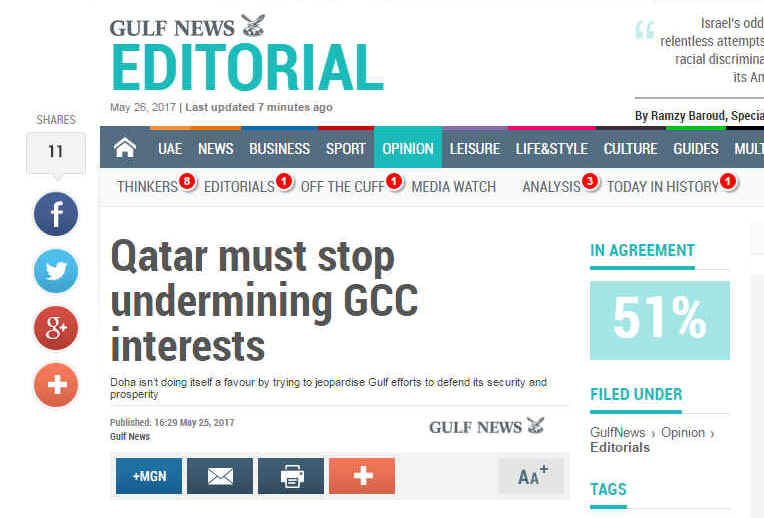
Yesterday, the Emirati-based Gulf News weighed in with an editorial comment headed "Qatar must stop undermining GCC interests". It began by talking about the "success" of the Gulf Cooperation Council (Bahrain, Kuwait, Oman, Qatar, Saudi Arabia and the UAE) in confronting various challenges over the years, and continued ...
"Today, the GCC is faced with another challenge. And unfortunately, it is coming from within the ranks of the group. Shortly after the conclusion of last week’s GCC Consultative Summit in Riyadh, we were stunned by remarks, attributed to the Emir of Qatar, Shaikh Tamim Bin Hamad Al Thani, during a military ceremony on Tuesday, in which he appeared to defy not only the official GCC policies on most critical issues — particularly Iran, Hamas and Hezbollah — but also to hint that the American bases in Qatar were the only guarantee to safeguard his country from the 'threat posed by some neighbouring countries'.
"While the three summits hosted by Saudi Arabia last Saturday and Sunday, in the presence of United States President Donald Trump and leaders of 57 Muslim countries, agreed that Iran was fuelling conflicts and sectarian tension in the region, Shaikh Tamim has been quoted by the Qatari official news agency as saying: 'Iran represents a regional and Islamic power that cannot be ignored and it is unwise to face up against it. It is a big power in the stabilisation of the region'."
The editorial went on to dismiss Qatar's claim that the report of the emir's speech was fabricated and had been posted on the news agency's website by subterfuge:
"A quick look at the archives showed that the emir’s statement was not only carried by the news agency on its official website and Twitter account, but also on Qatari state television and other online platforms that belong to the state media outlets."
The Saudi-owned al-Arabiya has made a similar argument but it doesn't stand up to scrutiny. The idea is that these multiple references serve as corroboration of the emir's imaginary speech. They don't, because they are all derived from the same source – the faked report on Qatar News Agency's website.
But how did the report of the emir's speech come to appear on the news agency's website?
One possibility might be some form of sabotage or mischief-making within the agency. At present there is nothing to suggest this is what happened but it would be unwise at this stage to rule it out. However, looking at some external cause – which currently seems more likely – there appear to be two possibilities.
One would be direct hacking of the agency's website to post fake content. This might seem the most obvious way but the same result could also be achieved by hacking into the agency's editorial system.
Hacking the editorial system could be a lot easier than hacking into the website. All it needs is the user name and password of a single employee. Once inside the editorial system, posting a fake news item would be a relatively simple matter. If the employee had a high enough level of access it might also be possible to manipulate the agency's social media accounts without needing any additional passwords.
At present, though, this is just a theory of how the story got there. Any further thoughts or information from readers are welcome.
Blow by blow: the Gulf's extraordinary war of words over Qatar
Blog post, 26 May, 2017: On his recent trip to the Middle East, Donald Trump posed for cameras sitting side by side with the emir of Qatar. "We are friends," Trump said, shaking the emir's hand. "We have been friends now for a long time. Our relationship is extremely good." So good, apparently, that Trump was hoping to sell Qatar "lots of beautiful military equipment, because nobody makes it like the United States."
Little more than a week later, though, the emir is in the doghouse and, if you believe his critics, not the sort of person to be trusted with American weaponry, no matter how "beautiful" it might be. Since Tuesday, Qatar and its emir have faced a barrage of attacks from Saudi and Emirati media – attacks which have clearly been launched with the blessing of their respective governments. Qatar now stands accused of jeopardising the Gulf's security and prosperity, and – in the words of one headline – committing political suicide.
The trigger for this furore was a news item purporting to quote remarks made by the emir at a military graduation ceremony in Qatar. The story appeared briefly on the website of Qatar's official government news agency, QNA, before the website went offline amid Qatari claims that it had been hacked. Days later, the website is still unavailable.
After some initial uncertainty about the authenticity or otherwise of the report, it is now clear that the story was fabricated. A military ceremony did take place and the emir was present but numerous sources – including people who were there – insist that the emir made no speech.
The event had also been filmed for Qatari television but none of the broadcast footage shows the emir speaking. All claims about what the emir is supposed to have said are derived from a single source: the now-vanished story on the news agency's website.
Hacking claims dismissed
Regardless of that, Saudi and Emirati media continue to behave as if the story was true. While some have reported Qatar's claims of fabrication – only to dismiss them – others have ignored them completely. On Wednesday, for example, Sky News Arabia, based in the Emirates, reported (in Arabic) that QNA had "withdrawn" the story without mentioning Qatar's claims that the website had been hacked. Instead, it invited readers to watch a video of the emir's speech as broadcast on Qatari television. Disappointingly for viewers, video showed scenes from the military ceremony but none of the emir speaking.
With a little more honesty, Saudi-owned al-Arabiya and Gulf News in the Emirates did acknowledge Qatar's complaints of hacking, after a fashion, by posting short reports from Agence France Presse (cached copies here and here) but these have since disappeared from their websites (here and here).
In any case, Al-Arabiya made clear that it did not believe the website had been hacked. On Wednesday it published an article claiming to have "proof" that QNA was not hacked. Basically, it cited Qatari television and QNA's social media accounts as corroboration for the story of the emir's speech when all they had done was regurgitate bits of the bogus report while it was still live on QNA's website. (For more details see previous blog post.)
Meanwhile, on Saturday, an article in the Saudi Gazette continued to attack the emir as if his speech were an established fact. "There was no justification for what the Qatari ruler, Sheikh Tamim Al-Thani, said," it complained:
"The worst impact of his speech was that it drew condemnation of Qatar’s strange political behaviour. It also exposed the Emir’s haughtiness and his move to compare himself with highly experienced rulers in the region who have mastered the art of politics, ruling large countries and steering them through major events and crises, unlike Qatar, which has only experienced a storm in a teacup."
The scale and ferocity of this onslaught has been extraordinary, though the visible part so far is only a media war: the Saudi and Emirati governments have been almost entirely silent, though they have blocked various Qatar-linked news websites. But to view this frenzy as something cooked up purely by the media would be a mistake. Mainstream journalists in the Arab countries don't suddenly start attacking another Arab head of state without some signal of approval from on high: it would be more than their jobs (and liberty) are worth.
Al-Arabiya, based in Dubai's Media City and owned by the Saudi MBC company, is a competitor of Qatar's al-Jazeera. Between Wednesday and Sunday it posted at least ten articles about the emir and/or his alleged speech, most of them hostile:
- Proof that Qatar News Agency was not hacked
- Qatari Emir: Doha has ‘tensions’ with the Donald Trump administration
- Dhahi Khalfan says Qatar favors Iran, Muslim Brotherhood over Arab countries
- Qatar: It is about policies not news
- Qatar faces hostile media campaign, particularly in the US
- What Bin Laden documents reveal about his relations with Qatar
- Who runs Qatar behind the scenes?
- Hezbollah and Qatar – a story of forbidden love?
- Qatar’s Emir Tamim calls Iran’s President Rouhani seeking ‘deepening of ties’
- Al-Sheikh family in Saudi Arabia: Gulf emir attribution to our family is fake
The last of these articles is rather amusing. It accuses the emir of falsely claiming descent from Muhammad ibn Abdul Wahhab, founder of the intolerant Wahhabi sect whose doctrine lies at the root of many of Islam's contemporary problems. Saudi Arabia is surely the only country where people would think worse of someone for not being related to Abdul Wahhab.
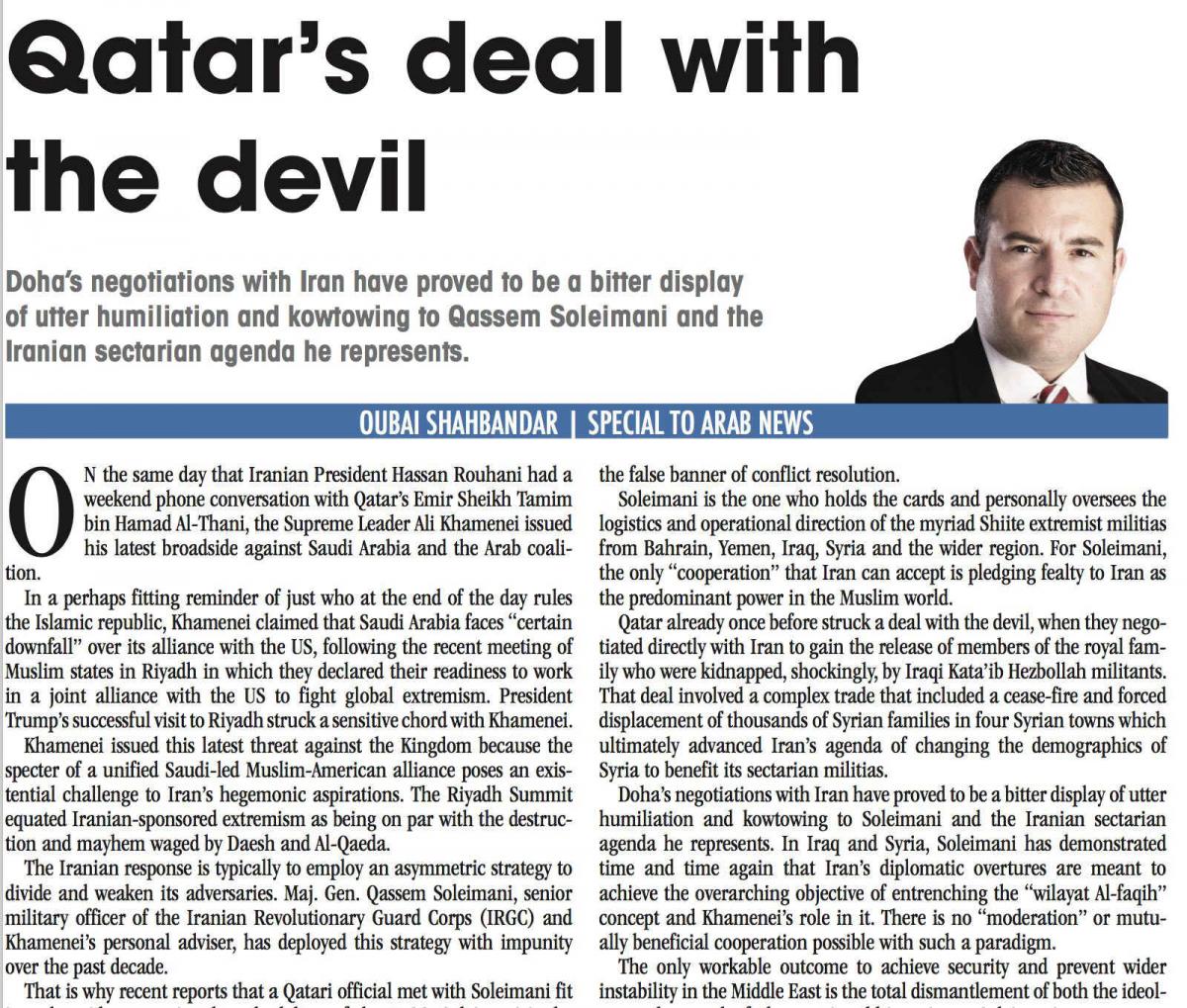
Also in Saudi Arabia, the English-language Saudi Gazette had three articles on three consecutive days attacking Qatar:
- ‘Qatar’s hacking claim hard to swallow’ – 25 May
- Our neighbor Al-Jazeera, why? – 26 May
- Qatar’s political suicide – 27 May
In the Emirates, meanwhile, Gulf News published seven Qatar articles over two days:
- US contemplates sanctions against Qatar
- Qatar Emir stirs controversy by defending Iran and Hezbollah
- Gulf slams Qatar stance on Iran and Hezbollah
- Qatar says state news agency hacked
- Qatar must stop undermining GCC interests
- Bahrain, Egypt block Al Jazeera websites amid Qatar dispute
- Secret Qatari-Iranian meeting held in Baghdad: report
The last item is a bizarre tale of intrigue alleging that Iraq helped set up a secret Qatari-Iranian meeting in Baghdad – at a cost to Qatar of $500 million:
"The secret meeting had been arranged by the Iraqi government in return for Doha not demanding $500 million left suspiciously by Qatari officials at Baghdad airport following the release of Qatari hostages held during a hunting trip in southern Iraq."
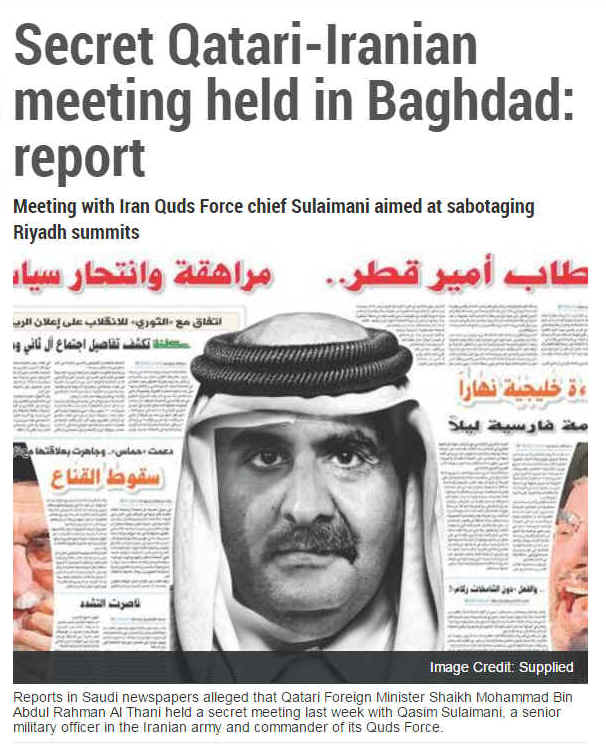
Bringing Qatar into line
The onslaught against Qatar continued on Saturday with a stern editorial in the Emirati newspaper The National:
"Comments such as these by the emir are profoundly dangerous. They destabilise relations within the GCC. They sow division between the GCC and our allies around the world. And of greatest concern, they give Iran the perception that it can divide the Gulf states."
The editorial also cast doubt on Qatar's claim of a cyberattack, saying its protestations of innocence would carry more weight if the emir's reported comments had "deviated wildly from his country’s stated policies and world view. No wonder the Gulf states are reluctant to believe Doha’s explanation."
That is an interesting point, because Qatar is in the odd position of denying having said things that it actually thinks. The remarks attributed to the emir at the military ceremony mostly reiterated Qatar's previously-known positions on various issues – notably Iran and terrorism.
The question this raises is why anyone would see a need to concoct an imaginary speech that reflected the emir's real views, or something pretty close to them.
One answer is plausibility. The purpose of fake news is to fool people into believing it and, as things stand, there are plenty who believe the quoted remarks from the emir were genuine. Too much deviation from things the emir might be expected to say would have cast doubt on the story's authenticity.
The key point, though, is not so much the story's content as its timing – just two days after the "Muslim summit" in Riyadh attended by Trump. It looked like a defiant gesture from the emir towards a meeting which had succeeded in deflecting attention away from the machinations of Arab states and focused on Iran as the main cause of the region's problems.
Without the story of the emir's speech there would probably still have been rumbings about Qatar's attitude from other Gulf states but the story – true or not – provided something around which to build a campaign aimed at bringing Qatar into line.
An American connection
According to Qatar's foreign minister, Mohammed bin Abdulrahman Al-Thani, there had already been moves in the United States to put pressure on Qatar ahead of the summit. During the previous five weeks, he said, 13 articles about Qatar had appeared in American media – which the minister considered an unusually large number.
At least four of these articles, though in different publications, had all been written by people working for a single Washington-based think tank, the Foundation for Defense of Democracies (FDD):
- Congress must press Qatar for highlighting hate preacher – David Weinberg, The Hill, 30 April
- Fooling many of the people much of the time – Clifford May, Washington Times, 9 May
- By Hosting Hamas, Qatar Is Whitewashing Terror – Kate Havard and Jonathan Schanzer, Newsweek, 11 May
- Qatar Needs to Do Its Part – John Hannah, Foreign Policy, 22 May
By a remarkable coincidence, on 28 May – the day of the emir's alleged speech to his troops – the Foundation for Defense of Democracies was holding a conference in Washington aimed at influencing American policy towards Qatar. Organised in conjunction with the Hudson Institute and the Center for Cyber and Homeland Security, its title was "Qatar and the Muslim Brotherhood’s Global Affiliates".
During a "keynote discussion" chaired by Fox News anchor Jenna Lee, Robert Gates (a former defense secretary under the Bush administration) accused Qatar of reneging on previous commitments and said the US should send an envoy to the emir with a list of activities that Qatar must stop supporting, "otherwise the nature of its relationship with them will change". Gates also hinted that the US might pull out of the Udeid airbase in Qatar (built at the previous emir's expense) which serves as Centcom's forward headquarters.
In another session at the conference, Ed Royce, chair of the Foreign Affairs Committee in the US House of Representatives, said he would introduce legislation threatening sanctions against countries that provide support for “terrorist elements of the Muslim Brotherhood” and Hamas in particular. Royce suggested the threat of sanctions could persuade Qatar to end its support for the Brotherhood. “We need to see a change in behaviour immediately,” he added.
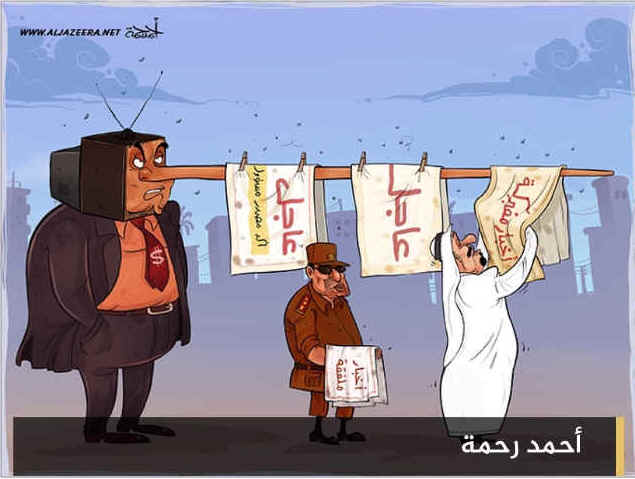
Terrorism and politics
Qatar certainly has dodgy friends, but targeting it in this way is more about politics than combating terrorism. If terrorism were the main issue there would also be talk of sanctioning Saudi Arabia (to name but one) instead of supplying it with weapons.
Qatar's choice of dodgy friends is also quite eclectic. Besides Islamists, it has also developed connections with the religious right in the west – most notably Mormons and the more reactionary sections of the Roman Catholic church. It even funded research by a British think tank which helped to shape the social policies of David Cameron's government. That sort of activity by Qatar rarely gets a mention.
However, the central issue in the current war of words appears to be Qatar's relations with the Gulf Cooperation Council and Iran. Qatar is a member of the GCC, along with Bahrain, Kuwait, Oman, Saudi Arabia and the UAE but, to the disappointment of these other members, generally tries to chart its own course where foreign policy is concerned.
In particular, it doesn't buy the GCC's often hysterical view of Iran. There's also a practical reason for that, since geography has forced Qatar and Iran to share the world's largest gas field.
James Dorsey, a senior fellow at in international studies at Singapore’s Nanyang Technological University, explores the political background in a recent article. Dorsey sees the latest moves as an attempt to pull Qatar – kicking and screaming, if necessary – more firmly into the GCC fold:
"Seemingly emboldened by Mr Trump's blanket endorsement of Saudi Arabia's proxy war against Iran and UAE Crown Prince Mohammed bin Zayed's visceral opposition to political Islam, Gulf states appear to believe that the time is right to again pressure Qatar to alter policies it sees as key to its national security. The crown prince reportedly maintains a close working relationship with powerful Saudi Deputy Crown Prince Mohammed bin Salman.
"An earlier attempt by Saudi Arabia, the UAE and Bahrain to force Qatar to align itself with the three states’ hard line positions failed in 2014 when Qatar refused to bow after they withdrew their ambassadors from Doha. The ambassadors returned to their posts after a 10-month absence with little, if any, change in Qatari policies."
It remains to be seen whether Qatar's Arab neighbours will have more success this time than they did in 2014.
Mediation attempt in Gulf states' feud with Qatar

Blog post, 31 May, 2017: The emir of Qatar is reportedly flying to Kuwait today to exchange Ramadan greetings with Kuwait's emir – something that he apparently has to do in person rather than by phone. There is not much doubt, though, about the real purpose of the visit. It's an attempt to cool down the war of words between Saudi Arabia and the UAE on one side, and Qatar on the other, which has been raging for the past week.
There are suggestions that after his Kuwait meeting the emir of Qatar may travel on to Oman which has also played a mediating role in the past.
Saudi Arabia clearly expects (or at least hopes) that Qatar is about to capitulate. According to the Saudi-owned al-Arabiya, Kuwait's mediation "will result in an agreement that includes several binding clauses for Qatar". It says the "most prominent" of these are:
- Stop interfering in the internal affairs of the Gulf States and Arab countries
- Stop incitement through Qatari media channels
- Halt naturalising any more citizens from other Gulf States
- Stop incitement against Egypt through its policies
- Stop supporting the Muslim Brotherhood Islamist group
- Removal of persons who are hostile to other GCC countries from Qatar’s territories, especially members of the Muslim Brotherhood
The verbal barrage against Qatar continued on Monday with an article from al-Arabiya headed "ANALYSIS: How Qatar and Iran’s hardliners are very much alike politically". Among other things, this accused Qatar of encouraging "disorder" in Yemen (where the Saudis have been dropping bombs for the last two years and meddling politically for decades).
On Tuesday, another article from al-Arabiya enumerated some of Qatar's alleged transgressions:
"Several recent events have heightened longstanding tensions in Qatar’s relations with three other members of the Gulf Cooperation Council (GCC): Bahrain, Saudi Arabia and the United Arab Emirates (UAE).
"These include incendiary comments about Iran, Hamas, Hezbollah, Israel and US President Donald Trump attributed to the Emir of Qatar; a reported Qatari-Iranian meeting in Iraq; Doha’s allegations of a foreign-orchestrated “hostile media campaign” against the emirate; and Emir Tamim’s phone call with the President of Iran. Now only time will tell whether this tension will escalate or quietly fade away." [Links are shown as they appeared in the article]
Although Saudi and Emirati media have been in the forefront of the campaign against Qatar, they appear to have different priorities. The UAE seems mostly concerned about Qatar's links with the Muslim Brotherhood while the Saudis focus on Qatari relations with Iran.
Basically, though, both countries (supported by Bahrain) are trying to engineer a shift in Qatar's foreign policy to bring it more into line with their own. In the words of the Khaleej Times, an Emirati newspaper, "Qatar has always been known for its erratic behaviour with regard to some of the core principles of the GCC".
In an earlier – unsuccessful – attempt to bring Qatar to heel in 2014, Saudi Arabia, the UAE and Bahrain withdrew their ambassadors from Doha. This resulted in an agreement known as the "Riyadh Document" – which Qatar is now accused of violating. The Khaleej Times article says:
"The agreement talked of evolving a mechanism wherein the actions of one GCC state does not affect and prejudice the sovereignty and interests of another GCC state.
"Qatar had at that time agreed to rein in extremist and dissident activists operating from its soil and control anti-GCC and anti-Egypt coverage by its media and television channels. But it took no time for Qatar to deviate from these solemn commitments and indulge in the same old malicious propaganda against neighbours which had led to the earlier rift.
"Even though some analysts do not rule out the possibility of reaching a political solution, the terms and conditions of the solution will be stronger and tougher this time and Qatar should seriously try to rebuild confidence that it had breached several times."
The difference this time is that Qatar's adversaries are more confident of success, since they appear to be counting on support from Donald Trump:
"With a new administration in Washington, the UAE is optimistic about a change in US policy vis-à-vis the Muslim Brotherhood and the Trump presidency representing an opportunity to apply enough pressure on Qatar to sever Doha’s ties with Islamists in the region."
Qatar elaborates on hacking claim
Yesterday the Guardian published a letter from Saif Ahmed Al Thani, head of Qatar's Government Communications Office, about the fake news item which triggered the current furore:
"Your article (Saudi Arabia and UAE block Qatari media over incendiary statements, 25 May) lends credence to the idea that fraudulent 'quotes' – falsely attributed to the emir of Qatar and Qatar’s foreign minister – placed by hackers on a Qatari website might actually be genuine. They are not.
"Allow us set the record straight: the government of Qatar noticed the appearance of ''hacked' material on the Qatar News Agency’s website at 12.15am on Wednesday 24 May. Qatar’s Government Communications Office released a statement at 1am alerting the news media that the quotes were not authentic. Most media outlets covered our statement and stopped publishing or broadcasting the fraudulent material.
"We next took control of a Twitter feed, also hacked, that was tweeting the false news that Qatar’s foreign minister had asked the ambassadors from a number of Gulf Cooperation Council countries to leave Qatar. We were eventually able to delete this content and advise Twitter users that Qatar had been the victim of a hacking attack.
"Your report said the fraudulent quotes appeared in a scrolling ticker at the bottom of the screen on 'Qatari state television’s nightly newscast'. In fact the offending material did not appear on Qatari state television but in a doctored version of the newscast that appeared on the Qatari News Agency’s YouTube channel, which had been hacked. The offending material was quickly removed once the hacking incident had been discovered.
"Qatar was the victim of 'fake news', and we have been working hard since the hacking incident to set the record straight. We have been especially troubled by the fact that various news organisations chose to reprint the bogus quotes even after the authenticity of those remarks had been categorically denied by our government."
The remarks attributed to the emir were purportedly made during a speech at a military graduation ceremony in Qatar on 23 May. Although the emir attended this event, numerous Qatari sources – including people who were there – insist that the emir made no speech. The event had been filmed for Qatari television but none of the broadcast footage shows the emir speaking.
A video of the military ceremony, grabbed from Qatari television, has been widely circulated on the internet but Qatar says there are two versions of it: one shows the original broadcast and the other has a doctored news ticker quoting remarks attributed to the emir. A post on Twitter from the head of Qatar Media Corporation shows the two versions side by side.
The content of the emir's purported speech was largely a reiteration of Qatar's known positions on various issues, including Iran and terrorism. But the timing of the fake story's appearance – two days after the "Muslim summit" in Riyadh attended by Donald Trump – along with what was seen as an inflammatory tone provided the trigger for a renewed campaign against Qatar.
On the same day that the fake story appeared a conference entitled "Qatar and the Muslim Brotherhood’s Global Affiliates" was being held in Washington, organised by the Foundation for Defense of Democracies in conjunction with the Hudson Institute and the Center for Cyber and Homeland Security
During a "keynote discussion" chaired by Fox News anchor Jenna Lee, Robert Gates (a former defense secretary under the Bush administration) accused Qatar of reneging on previous commitments and said the US should send an envoy to the emir with a list of activities that Qatar must stop supporting, "otherwise the nature of its relationship with them will change". Gates also hinted that the US might pull out of the Udeid airbase in Qatar (built at the previous emir's expense) which serves as Centcom's forward headquarters.
In another session at the conference, Ed Royce, chair of the Foreign Affairs Committee in the US House of Representatives, said he would introduce legislation threatening sanctions against countries that provide support for “terrorist elements of the Muslim Brotherhood” and Hamas in particular. Royce suggested the threat of sanctions could persuade Qatar to end its support for the Brotherhood. “We need to see a change in behaviour immediately,” he added.
UAE-Qatar feud: Abu Dhabi's crown prince said 'give them hell'
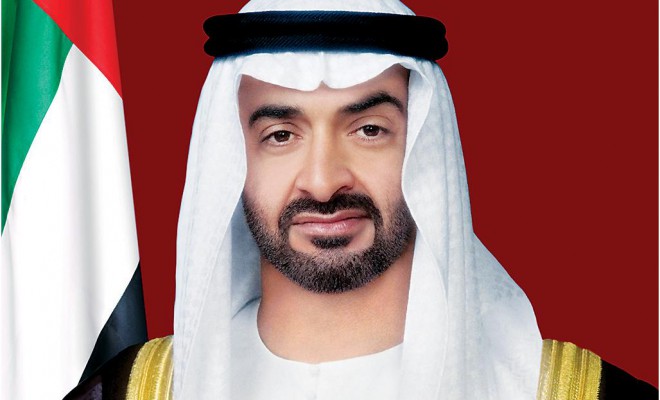
Blog post, 4 June, 2017: The day before unknown persons hacked a government website in Qatar, triggering a vicious media feud among Gulf states, the crown prince of Abu Dhabi was urging a former CIA director to give the Qataris "hell".
On 23 May, a conservative think tank with strong Israeli connections held a conference in Washington aimed at putting political pressure on Qatar. Admission was by invitation only and the event was "heavily attended by officials from the Trump administration".
Later that day, a story appeared on the website of Qatar's official news agency reporting a speech allegedly made by Qatar's emir at a military graduation ceremony. Qatar said the website had been hacked and the story was a fake.
People who were present at the military ceremony insist that the emir made no speech and none of the available video footage shows the emir speaking. Nevertheless, remarks attributed to the emir re-ignited old quarrels between the UAE and Saudi Arabia on one side, and Qatar on the other (see previous blog post for more background).
The keynote speaker at the Washington conference was Robert Gates, a former CIA chief who also served as US Secretary of Defense under President George W Bush.
On 22 May, Gates sent an email to Yousef al-Otaiba, the Emirati ambassador in Washington, apparently apparently alluding to his talk at the conference next day. Gates wrote:
"Happily it's not a speech but a fireside chat. But I think I'll have the chance to put some folks on notice."
Replying to this, ambassador Otaiba wrote:
"MBZ sends his best from abu dhabi. He says 'give them hell tomorrow'."
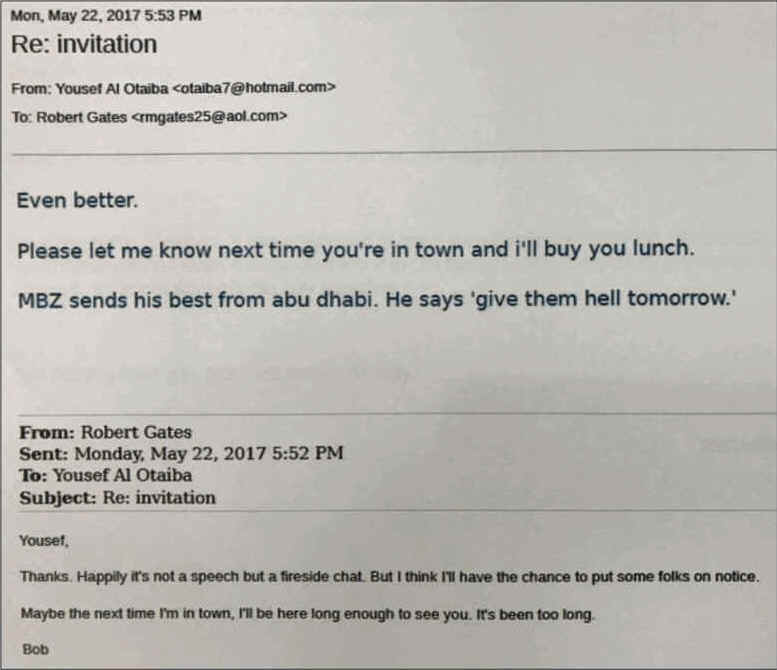
The letters "MBZ" refer to Mohamed bin Zayed, crown prince of Abu Dhabi and deputy commander of the UAE’s armed forces.
At the conference next day, Gates accused Qatar of reneging on its commitments and said the US should send an envoy to the emir with a list of activities that Qatar must stop supporting, "otherwise the nature of its relationship with them will change".
Gates also suggested a way of pressurising Qatar into compliance – by threatening to pull US forces out of the Udeid airbase in Qatar (built at the previous emir's expense) which serves as Centcom's forward headquarters.
Qatar, which had not been invited to send anyone to explain its own position to the conference, viewed this as part of an orchestrated campaign. Its foreign minister pointed to numerous articles that had been appearing in American media ahead of the conference. At least four of these had been written by people working at the Foundation for Defense of Democracies, the main organiser of the Washington conference:
Congress must press Qatar for highlighting hate preacher – David Weinberg, The Hill, 30 April
Fooling many of the people much of the time – Clifford May, Washington Times, 9 May
By Hosting Hamas, Qatar Is Whitewashing Terror – Kate Havard and Jonathan Schanzer, Newsweek, 11 May
Qatar Needs to Do Its Part – John Hannah, Foreign Policy, 22 May
The Foundation for Defense of Democracies (FDD) is not very prominent among Washington think tanks but, according to John Judis in an article for Slate magazine, it has played major role in providing "intellectual firepower" for efforts to overturn the nuclear deal with Iran. In 2013, an investigation by Slate magazine found that FDD was mainly funded by three wealthy American Republicans – Bernard Marcus, Paul Singer and Sheldon Adelson – who were also strong supporters of Israel. Adelson is said to be a close friend of Israeli Prime Minister Benjamin Netanyahu.
Among the six Gulf Cooperation Council states, Saudi Arabia, the UAE and Bahrain have a hostile view of Iran – and on that point they have something in common with Israel. Qatar, which shares the world's largest gas field with Iran, takes a more conciliatory line and, to some extent, Kuwait and Oman do too.
Last month's "Muslim summit", which was attended by Donald Trump, initially looked like a victory for the anti-Iran hardliners but its actual effect has been to open up divisions among the Gulf states. The attacks on Qatar seem mainly intended to make it comply with the Saudi/Emirati view but they have also focused on Qatar's alleged support for terrorism and its connections with the Muslim Brotherhood and Hamas (another Israeli concern). One effect of highlighting Qatar in this way is that it helps divert attention from Saudi Arabia's Wahhabi ideology and its role in spawning groups like al-Qaeda and ISIS.
Embassy emails leaked
The pre-conference email exchange between former CIA chief Gates and UAE ambassador Otaiba was part of a series of emails that surfaced on Friday, circulated by a group calling itself "GlobalLeaks" and using a free email account from a Russian provider. Other emails in the series show a warm and apparently cooperative relationship between FDD and the Emirati ambassador.
Several of these discuss arrangements for a proposed visit to the UAE on June 11-14 by three of FDD's staff: Mark Dubowitz, Jonathan Schanzer and John Hannah. On 23 April, Hannah wrote to Otaiba saying "our primary goal is to establish an ongoing professional relationship with the UAE's top governmental experts on various aspects of the Middle East". Hannah added that he hoped the trip would lay "a strong foundation for future mutually beneficial cooperation between our respective institutions".
FDD provided the embassy with a draft agenda for the trip and the names of senior Emiratis – including Crown Prince Mohamed bin Zayed – that its staff were hoping to meet.
Next day, Hannah sent a further email to the ambassador, adding another name to the request list:
"Youssef: one other thing, if appropriate on your end, Schanzer (who is in AD [Abu Dhabi] from evening 11th the early morning 13th) and I would like to request a meeting with Dahlan, if he's willing and available."
"Dahlan" presumably refers to Mohammed Dahlan, the former head of Palestinian “preventive security” in Gaza, who left Palestine amid accusations of corruption. On the face of it, asking an Emirati ambassador to arrange a meeting with Dahlan might seem an odd thing to do, but since leaving Palestine Dahlan has reportedly been working as a security adviser to Crown Prince Mohamed bin Zayed.

The use of a Russian email address for circulating the leaked documents points to Russia as the source, but that could be a deliberate smokescreen. One obvious possibility – though currently not supported by any evidence – is that the leak might have been intended as a reprisal for the hacking of Qatar News Agency's website.
However, it's not clear that the UAE ambassador's leaked emails were obtained through hacking. The documents posted online appear to be photographs of email print-outs rather than electronic copies.
Yesterday, Qatari media quoted an unnamed source as saying that "an FBI team" has been in Doha for the last week ;helping to investigate the security breach at Qatar News Agency. Two other unnamed countries were also said to be assisting. Twelve days after the incident, the agency's website is still offline.
In another odd development, the Twitter account of Bahrain's foreign minister was hacked yesterday. IB Times reports:
"The hackers posted a slew of disturbing images and threats against the royal family including one tweet that read: 'We are going to paint the floor with your blood'."
The hackers also changed the minister's name of the Twitter account to Arabic words that mean "Ball of meat". This is a nickname previously used by the Bahrain regime's opponents, because the minister is overweight.
Material posted on the minister's Twitter feed suggests this was the work of Shia militants but, given the timing of the attack, a connection with the Qatar hacking and the UAE embassy leak should probably not be ruled out.
Qatar in the crosshairs – but where will it end?
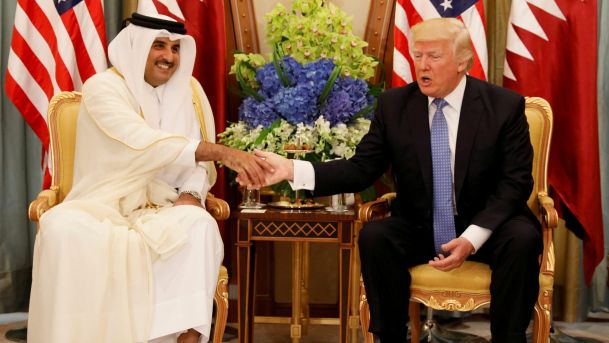
Blog post, 6 June 2017: The extraordinary propaganda offensive against Qatar which has been raging in sections of the Arab media for the last couple of weeks shifted from words to deeds yesterday when Saudi Arabia, the UAE, Bahrain and Egypt in effect placed Qatar under siege.
There are four possible outcomes to this:
1. That Qatar will capitulate and bring its foreign policy far more into line with Saudi and Emirati policies – especially in relation to Iran and terrorism.
2. That Qatar will offer enough concessions for a compromise solution to be found.
3. That Qatar will leave the six-member Gulf Cooperation Council – making "Qaxit" the Gulf version of Brexit.
4. That the Gulf Cooperation Council will eventually disintegrate.
Actions against Qatar
Before considering those scenarios, let's look at the actions announced yesterday against Qatar.
- Diplomatic and consular relations with Qatar are suspended.
- Qatar's only land border (with Saudi Arabia) is to be closed.
- Saudi Arabia and Egypt (and possibly others) are closing their airspace to Qatari civil aviation.
- Qataris in Bahrain, Saudi Arabia and the UAE must leave within two weeks.
- All travel to Qatar by Saudis, Emiratis and Bahrainis is prohibited.
- Qatar, which had contributed about 1,000 troops to the war in Yemen, is expelled from the Saudi-led coalition.
Adding numbers – if not weight – to these measures, further declarations of support are said to have come from the failed state of Libya, from one of Yemen's two rival governments, and the tiny Maldives islands (fast disappearing under the Indian Ocean as a result of global warming).
Saudi-Emirati demands
Last week the Saudi-owned al-Arabiya published a series of demands which it said would be "binding" on Qatar in any agreement. The "most prominent" of these were:
- Stop interfering in the internal affairs of the Gulf States and Arab countries
- Stop incitement through Qatari media channels
- Halt naturalising any more citizens from other Gulf States
- Stop incitement against Egypt through its policies
- Stop supporting the Muslim Brotherhood Islamist group
- Removal of persons who are hostile to other GCC countries from Qatar’s territories, especially members of the Muslim Brotherhood
Writing for Newsweek, Sultan Sooud al-Qassemi (an Emirati) elaborates on this:
"Judging from local newspapers the series of demands appears similar to the 2014 list – namely an end to Qatari 'interference' in domestic politics – but this time the escalation has been so severe that is it unlikely to be resolved as easily.
"Ultimately the three Gulf States do not feel that Qatar has lived up to its side of the agreement: that rather than ceasing the critical media coverage and the support of Islamist groups it has found other means to do so. It is likely that this time the Gulf States will demand the complete shuttering of the Al Jazeera TV Network before any mediation can take place. Additionally, the plug will have to be pulled on networks funded by Qatar such as Al Araby Al Jadeed (The New Arab), originally set up to compete with Al Jazeera and headed by former Arab Israeli politician Azmi Bishara.
"Other Qatar backed networks that were accused of incitement on official Gulf TV channels include Al Quds Al Arabi (Arab Jerusalem) newspaper which was founded in London in 1989, online Arabic news portal Arabi 21, the London based website Middle East Eye, the Arabic version of Huffington Post which is headed by former Al Jazeera boss Waddah Khanfar and Al Khaleej Al Jadeed (the New Gulf).
"The Gulf States and their Egyptian ally will also demand the expulsion of all Muslim Brotherhood leaders and their Hamas affiliate figures from Qatar, along with Azmi Bishara and Islamist writer Yasser Al-Za'atra. Other demands will include the sacking of Al Arab newspaper editor Abdullah Al Athba who despite his unceasing and vapid criticism of the UAE has remained on top of the country’s most important newspaper for years."
Will Qatar surrender?
It is difficult to envisage Qatar voluntarily acceding to these demands in full, since that would amount to a very public humiliation. It's very unlikely that the current emir would agree to them, though there have been hints (which some interpret as veiled threats) that he might be overthrown. Last week, the head of a pro-Saudi lobbying group in the US suggested the emir could suffer the same fate as Egypt's ousted president, Mohamed Morsi. Emirati and Egyptian newspapers have also been talking-up opposition to the emir from within Qatar's royal family.
The immediate question, though, is whether the measures announced by other Arab states are likely to force a shift in Qatar's position.
Qatar depends almost entirely on imported food and yesterday there were reports of panic-buying in the shops. About one-third of its $1bn-a-year food imports come via Saudi Arabia and the UAE, so cutting off those supplies would harm Saudi and Emirati businesses. For Qatar, though, finding alternative sources would not be an insuperable problem. Iran has already offered to step into the breach and this could drive Qatar and Iran closer together – with the opposite effect to what was intended.
James Dorsey, a senior fellow in international studies at Singapore’s Nanyang Technological University, writes:
"As food trucks reportedly lined up at the closed Saudi border with Qatar, Iran’s Fars news agency quoted Reza Nourani, chairman of the union of exporters of agricultural products, as saying that Iran could supply the Gulf state with what it needs. Mr Nourani said it would take 12 hours for shipments from Iran to reach Qatar by sea.
"Working in Qatar’s favour is the fact that the Gulf state’s main source of revenue, its oil and gas exports, remain untouched by the economic sanctions. Qatar, the world’s largest LNG supplier, maintains access to international shipping route even if Qatar-bound vessels and ships leaving the Gulf state are barred from entering the territorial waters of Saudi Arabia, the UAE and Bahrain.
"Japan's JERA Co, the world's biggest buyer of liquefied natural gas, said in a statement that Qatargas had informed it that the crisis in the Gulf would not impact LNG supplies.
"The UAE, moreover, in what appears to be a self-serving move has not included the import of Qatari natural gas in its sanctions. The gas is exported to the UAE as well as Oman through a pipeline that is co-owned by Abu Dhabi’s state-owned Mubadala Development Company. Sources said there was no indication that the pipeline would be closed."
A potentially much more serious problem is the restrictions on aviation. Although Qatar Airways will be severely affected, the Centre for Aviation (CAPA) warns on its website that there will be "no long term winners from this". CAPA suggests the restrictions cannot be sustained for long because although Qatar Airways – which operates more flights than all the Gulf's other airlines combined – will be hardest hit, there will be adverse effects on Gulf aviation more generally.
One big effect on Qatar Airways will be the loss of connecting traffic from Saudi Arabia and the UAE which forms a large part of its market.
Closure of Saudi airspace means Qatari flights heading north and west will have to be diverted over Iran, adding considerably to mileage, expense and journey time. The extra distance will make some flights impossible without a refuelling stop.
CAPA's report also goes into detail about the legalities of closing airspace to Qatari flights. It appears that while the Saudis can legally close their airspace, the UAE, Bahrain and Egypt cannot – since (unlike Saudi Arabia) they are parties to the 1945 international Transit Agreement. However, CAPA also points out that even if those countries are in breach of the agreement there is no effective international mechanism for enforcing compliance.
Scope for a compromise deal?
Although the measures announced yesterday are likely to prove costly for Qatar, they are unlikely to bring it swiftly to its knees. Qatar is certainly not short of money, and there will be costs on the other side too.
Meanwhile there are hopes that Kuwait and/or Oman – two GCC countries sitting judiciously on the sidelines in the current feud – may help to broker a compromise.
There might be some scope for concessions from Qatar regarding controversial Islamist figures sheltered by Qatar. Dorsey notes that Qatar has already made limited gestures in that direction: "As tensions mounted in recent days it ejected senior members of the Palestinian branch of the Brotherhood, Hamas, and repatriated a dissident wanted in Saudi Arabia."
But there is probably only so far that Qatar would be willing to go, because of what Mehran Kamrava, Professor of Middle Eastern Studies at Georgetown University's branch in Qatar, describes as its "hedging strategy":
"Qatar has ... placed itself under the security umbrella of the United States. But instead of aligning the minutia of its foreign policy interests and objectives with those of the United States, it has sought to maintain open lines of communication with as many actors as possible, not all of whom always get along together. This foreign policy approach keeps potential adversaries to a minimum and enables Qatar to capitalise on its strategic positioning as a critical conduit for information and communication between actors that would otherwise be unable to communicate.
"But Qatar’s hedging strategy has not been without its drawbacks. Principally, for countries like Saudi Arabia, the UAE, and the US, Qatar’s continued relations with actors such as Hamas, the Muslim Brotherhood, or Iran is tantamount to treason. Doha’s approach is not seen as a means of minimising adversaries and maximising strategic value, but rather as a betrayal of fraternal bonds and as inherently duplicitous."
It's also worth noting that in additions to its Islamist connections, Qatar has also cultivated ties with religious conservatives in the west, notably Mormons and Roman Catholics.
The Saudis and Emiratis also appear to be seeking closure (or at least a drastic reining-in) of al-Jazeera and other Qatari-funded media. This, incidentally, would leave al-Arabiya (Saudi-owned) and Sky News Arabia (part Emirati-owned) as the dominant regional broadcasters.
But for Qatar, al-Jazeera is far more than a TV station. It is a way of projecting soft power, and a key instrument of foreign policy. Much as Saudis, Emiratis and others may fulminate against al-Jazeera (and peripheral Qatar-funded media), they are not in the same category as Breitbart in the US or the Russian propaganda channel, RT. Obviously they have a political slant but in most respects they are normal news organisations.
On Qatar's side, then, the scope for compromise seems fairly small and would probably not be enough to satisfy the Saudis and Emiratis who also fear that Qatar would try to renege on any agreement.
A Gulf Non-cooperation Council?
The danger for the Saudis and Emiratis is that their current strategy, far from drawing Qatar into the fold, could send it in the opposite direction. The GGC Six could easily become the GCC Five.
But it might get worse than that. Oman has long been a lukewarm GCC member, often excusing itself from Saudi initiatives promoted in the GCC's name. Kuwait sits quietly and patiently, ready to mediate in disputes – though that role has become more difficult recently with the arrival on the scene of Prince Mohammed Bin Salman, the Saudi king's impetuous son. If the situation continues, Oman and Kuwait may soon be weighing up the benefits and costs of GCC membership.
Meanwhile, just below the surface, all is not well between Saudi Arabia and the UAE, the two leaders of the feud with Qatar. In the disastrous Yemen war they seem to be increasingly working at cross-purposes.
Further reading
Qatar: The Gulf's Problem Child
Kristian Coates Ulrichsen, The Atlantic, 5 June 2017
Qatar’s Gulf allies have had enough of Doha’s broken promises
Sultan Sooud Al-Qassemi, Newsweek, 5 June, 2017
Gulf crisis: Surrender or dig in for the long haul
James Dorsey's blog, 6 June 2017
A family feud
The Economist, 5 June 2017
What Does the UAE Want?
Mehran Kamrava, Center for International and Regional Studies, 5 June 2017
Trump dives into Qatar feud, but will America follow him?
Blog post, 7 June 2017: It is hard to imagine that when the Saudis and Emiratis embarked on their ferocious confrontation with Qatar they would have done so without believing they had Donald Trump's support. Their quarrel with Qatar was far from new but Trump's stance at the "Muslim summit" in Riyadh last month appeared to give them a green light for action.
To quote a recent article in the Emirati newspaper, The National, "the momentum of the Riyadh-Washington relationship meant that if there was a time to attempt to change Qatar’s behaviour, it was now".
Whether that's what Trump intended is another matter. Possibly it was just Trump being his usual clumsy self. He had, after all, shaken hands with Qatar's emir at the summit, declared him to be a friend, described their relationship as "extremely good" and expressed the hope of selling him "lots of beautiful military equipment".
Two days after the Riyadh summit, a fake news item planted on the website of Qatar's government news agency – apparently by hacking – provided the spark for an unprecedented wave of attacks on Qatar in Saudi and Emirati media which has now escalated into an economic blockade and a severing of diplomatic relations.
Yesterday Trump posted three tweets which appeared to back the Saudi/Emirati action:
During my recent trip to the Middle East I stated that there can no longer be funding of Radical Ideology. Leaders pointed to Qatar - look!
So good to see the Saudi Arabia visit with the King and 50 countries already paying off. They said they would take a hard line on funding...
...extremism, and all reference was pointing to Qatar. Perhaps this will be the beginning of the end to the horror of terrorism!
This, however, is a contentious position, even among American Republicans. There are plenty who want no truck with Saudi Arabia, especially in the light of the 9/11 attacks where 15 of the hijackers were Saudi citizens. Others fear Qatar-bashing could make things worse rather than better.
News of Trump's tweets reportedly "stunned" the Republican chairman of the Senate Foreign Relations Committee, Bob Corker.
“Our position generally as a nation has been that these things ebb and flow and they come up from time to time, but we work with all of the countries,” Corker told reporters. “Some of our Arab friends have different sensibilities relative to groups like the Muslim Brotherhood and others, and it’s created some dissension, and it’s been my policy that we work ... with everybody in the region in a way that’s constructive.”
Cooler heads than Trump recognise that Middle Eastern politics is rarely black and white. Writing for Defense News, Joe Gould cites a Congressional Research Service report:
"US concerns regarding alleged material support for terrorist groups by some Qataris have been balanced over time by Qatar’s counterterrorism efforts and its broader, long-term commitment to host and support US military forces active in Iraq, Afghanistan, and the rest of the CENTCOM area."
In sharp contrast to Trump, secretary of state Rex Tillerson has been calling for de-escalation of the Gulf feud and offering to mediate. “We certainly would encourage the parties to sit down together and address these differences, and we – if there’s any role that we can play in terms of helping them address those, we think it is important that the GCC remain unified,” Tillerson said on Monday.
Meanwhile, defense secretary James Mattis said he expected the quarrel to blow over: "I am positive there will be no implications coming out of this dramatic situation at all."
A Pentagon statement added:
"The United States and the coalition are grateful to the Qataris for their longstanding support of our [military] presence and their enduring commitment to regional security.
"We have no plans to change our posture in Qatar. We encourage all our partners in the region to reduce tensions and work towards common solutions that enable regional security."
Pressure for the US to adopt a tough line towards Qatar has been coming from the Foundation for Defense of Democracies (FDD), a Washington think tank which mainly reflects neoconservative and Israeli views. Emails leaked last weekend showed that FDD had been liaising in its effort with the Emirati ambassador in Washington.
On the day the inflammatory fake story surfaced in Qatar, FDD had been attacking Qatar at an invitation-only conference in Washington which was reported to be "heavily attended by officials from the Trump administration". The keynote speaker at the conference was Robert Gates, a former CIA chief and former Secretary of Defense under President George W Bush, who suggested pulling US forces out of the Udeid airbase in Qatar.
That idea has not been welcomed by the US military. Udeid serves as headquarters for CENTCOM and houses the largest concentration of military personnel in the Middle East – about 10,000 personnel. US forces have been based there since 2003, having transferred there from the Prince Sultan air base in Saudi Arabia after the Saudi authorities became nervous about their presence.
Qatar has allowed the US to operate from Udeid without any apparent interference – even during the invasion of Iraq when al-Jazeera television, just a few miles away, was broadcasting criticism of the American action.
Earlier today a report from Bloomberg pointed towards Saudi Arabia's deputy crown prince, Mohamed bin Salman, and the crown prince of Abu Dhabi, Mohamed bin Zayed, as the key Arab figures behind the attack on Qatar.
It is already known that bin Zayed, on the day before the anti-Qatar conference in Washington, sent a message to keynote speaker Robert Gates urging him to give the Qataris "hell".
However, the draconian measures taken against Qatar look more like a brainwave of the impetuous and inexperienced bin Salam. It was bin Salman who thought a bombing campaign would swiftly bring the Houthis to their knees in Yemen and, more than two years later, is no nearer to achieving that goal. As with Yemen, it's not clear how the Saudis and Emiratis can extricate themselves without loss of face if Qatar doesn't buckle under.
Further reading
Why Qatar is in the naughty corner
Raymond Barrett, New York Times, 6 June 2017
Qatar rift sets back Trump's 'Arab NATO'
Joe Gould, Defense News, 6 June 2017
The curious timing of the Qatar crisis
Sigurd Neubauer, Al Monitor, 6 June 2017
Gas-rich Russia next to ponder impact of Qatari dust-up
Daniel J Graeber, UPI, 6 June 2017
How Arab countries’ decision to break ties with Qatar complicates things for the US
Borzou Daragahi, BuzzFeed, 5 June 2017
Foreign Relations chairman stunned by Trump's Qatar tweets
Rebecca Kheel, The Hill, 6 June 2017
The Saudi Prince, the Sheikh and a Gulf Renegade
Donna Abu-Nasr, Zainab Fattah, and Ahmed Feteha, Bloomberg, 7 June 2017
US suspects Russian hackers planted fake news behind Qatar crisis
Evan Perez and Shimon Prokupecz, CNN, 7 June 2017
Trump logs on to Twitter to upend the diplomatic crisis in Qatar
Adrienne Mahsa Varkiani, Think Progress, 6 June 2017
UAE bans expressions of sympathy toward Qatar: media
Reuters, 7 June 2017
Why the Trump administration should reconsider Oman
Sigurd Neubauer and Yoel Guzansky, Arab Gulf States Institute in Washington, 30 May 2017
Isolating Qatar reveals economic vulnerabilities of the GCC
Karen E Young, Arab Gulf States Institute in Washington, 6 June 2017
Some items from Arab media:
The question now is how, not if, Qatar will change
Hassan Hassan, The National, 6 June 2017
There are lies, damned lies and Qatari statements
Faisal J Abbas, Arab News, 5 June2017
Did Qatari media side with Daesh by attacking MBC’s ‘Black Crows’?
Ben Flanagan, Arab News, 6 June 2017
An old story from 2011 ...
Oman breaks up UAE ‘spy ring’
Simeon Kerr, Financial Times, 30 January 2011
Robots and Russians: the Qatar hacking mystery deepens
Blog post, 8 June 2017: Yesterday, CNN suggested that Russian hackers may have been behind the planting of a fake news item on the website of Qatar's government news agency last month. The news item – a fictitious account of a speech purportedly made by Qatar's emir – provided the spark for a barrage of attacks on Qatar by Saudi and Emirati media which has now escalated into a full-blown international crisis.
Quoting unnamed "US officials", CNN said the indication of Russian involvement came from "intelligence gathered by the US security agencies".
Following the attack on the news agency's website, the US sent FBI investigators to help the Qataris discover how it happened. However, it's unclear whether claims of a Russian connection have come from the FBI investigators. CNN's report speaks of "intelligence" rather than actual "evidence" found in the news agency's computer system – which may indicate a non-FBI source.
Needless to say, Russia has denied the claim but, given Russia's reputation for cyber-skulduggery, it's superficially plausible. CNN also suggests a possible Russian motive:
"US officials say the Russian goal appears to be to cause rifts among the US and its allies. In recent months, suspected Russian cyber activities, including the use of fake news stories, have turned up amid elections in France, Germany and other countries.
"It's not yet clear whether the US has tracked the hackers in the Qatar incident to Russian criminal organisations or to the Russian security services blamed for the US election hacks. One official noted that based on past intelligence, 'not much happens in that country without the blessing of the government'."
One benefit of blaming Russia rather than – say – any of the Middle Eastern countries that are known to be hostile towards Qatar is that it's likely to have fewer international consequences. Russia is well accustomed to such accusations and adding Qatar to the list would only enhance its image as the leading electronic manipulator of other countries' politics.
At present there are no details of the "intelligence" that CNN was referring to but, viewed in the context of the hacking (Saudi and Emirati eagerness to discipline Qatar for what they see as its wayward foreign policy), Russia is not the most obvious suspect.
Another element in this affair was the leaking, last weekend, of embarrassing emails from an account belonging to the Emirati ambassador in Washington.
One obvious question this raises is whether it was a Qatari reprisal for the hacking of the Qatari website. If so, targeting of an Emirati ambassador could imply that the Qataris were blaming Emiratis for the hacking.
So far, though, there is no published evidence as to who was responsible for the hacking or the subsequent email leak. It's perhaps worth mentioning that the leaked emails were circulated by a group calling itself "GlobalLeaks" and using a free email account from a Russian provider. While the use of a Russian email address for circulating the leaked documents points to Russia as the source, that could have been a deliberate smokescreen.
Investigators' report
Yesterday, Qatar's interior ministry announced what it described as "preliminary results of ongoing investigations into the crime of piracy on the website of the Qatar News Agency (QNA) and its accounts on social networking websites".
Without providing any detail, the ministry said investigators had "confirmed that the piracy process had used high techniques and innovative methods by exploiting an electronic gap on the website of the Qatar News Agency. The investigation team was able to identify the sources through which the crime of piracy was committed ..."
The statement added that the FBI and Britain's National Crime Agency (NCA) had been working with Qatari investigators in accordance with "cooperation agreements signed between the State of Qatar and the United States of America and the United Kingdom". The NCA deals with organised crime, especially cross-border crimes such as smuggling, human trafficking and cyber crime.
Qatar says the interior ministry will hold a press conference to present "all the results" of the investigation once it is completed.
One potentially significant snippetofinformation in yesterday's statement was that the Qatari computer system had been compromised for more than three weeks before the fake story was posted on the website:
"The team confirmed that the hacked file was installed last April, which was later exploited in the publication of the fabricated news on 24/5/2017, at 12:13 am."
This seems to indicate that whoever hacked the website had been well prepared and was waiting for a suitable moment to strike.
Suspicious activity on social media
Yesterday, details emerged of other suspicious internet activity around the time of the hacking. Writing for the Washington Post's Monkey Cage section, Marc Owen Jones, a research fellow Exeter University's Institute of Arab and Islamic Studies, reported that just four days before the hacking incident an Arabic hashtag which translates as "Qatar is the treasury of terrorism" had been trending on Twitter. Further research showed that many of the accounts using this hashtag were bots – automated non-human accounts.
Following the leaking of the UAE ambassador's emails there was a further resurgence of activity by bots. Jones added:
"My analysis shows the presence of propaganda bots on numerous hashtags. One of these Twitter trends was #AlJazeeraInsultsKingSalman, and my analysis shows 20 percent of the Twitter accounts were anti-Qatar-bots. Many of them were posting well-produced images condemning Qatar’s relations with Hamas, Iran and the Muslim Brotherhood.
"Other images shared in the Twitter campaign singled out Qatar’s media channels as sources of misinformation. Almost all of the bot accounts tweeted support toward King Salman and Saudi’s new relationship with Trump. During the Riyadh summit [in May], these same bots posted thousands of tweets welcoming Trump to Saudi Arabia."
The technical data on which Jones's conclusions are based can be found on the Bahrain Watch website.
In his Washington Post article, Jones commented:
"What these bot armies represent is not an organic outpouring of genuine public anger at Qatar or Thani, but rather an orchestrated and organised campaign designed to raise the prominence of a particular idea. In the case of these bots, the intent appears to be legitimising the discourse that Qatar is a supporter of terrorism by creating the misleading impression of a popular groundswell of opinion.
"The fact that these bot armies existed before Qatar’s claims that they were hacked – and were in place quickly following the alleged hacks – indicate that an institution or organisation with substantial resources has a vested interest in popularising their criticism of Qatar. The purpose of this cyber propaganda may also be to shape the online discourse in favor of pressuring Qatar to abandon any thought of rapprochement with certain organizations or countries.
"Who is behind these hacks is unclear, but given that much of the bot propaganda appears to be the sewing of animosity between the Arab states and Iran, there is danger to regional stability if left unchecked. Twitter – once seen as an important resource for disseminating news across the GCC – may become a wasteland in terms of finding useful information from non-verified sources, undermining its usefulness as a tool for generating legitimate discussions.
"All the Gulf states have stringent freedom of expression laws that carefully control the Internet and the media – and monitor the behavior of their own citizens. Yet what’s interesting about the recent public display is that it highlights the use of cyber tools as forms of intra-GCC diplomatic warfare, tactics previously directed at countries like Iran, and not usually neighbouring Gulf states."
Jones has been monitoring the use of bots in the Gulf over the past year and his findings have been discussed in several previous blog posts:
Sectarian robots
22 June 2016
How robots have over-run the #bahrain hashtag on Twitter
23 June 2016
The automation of hate speech
29 June 2016
How Twitter robots spam critics of Saudi Arabia
28 July 2016
How the Middle East became an electronic battleground

Blog post, 18 June, 2017: Viewed in isolation, the temporary disappearance of Al Jazeera's Arabic-language Twitter account last Saturday might seem fairly insignificant. In the light of other events, though, it's yet another sign that political battles in the Middle East are increasingly being fought via the internet.
There's already a plentiful array of weaponry in use, from hacking and other forms of electronic harassment to politically-targeted phishing attacks, fake social media accounts, and robots programmed to deluge Twitter with propaganda or sectarian hate speech.
Exactly what happened between Twitter and Al Jazeera on Saturday is still not entirely clear. Twitter suspends lots of accounts, for all sorts of reasons, but it doesn't often suspend one like the Qatari broadcaster's @AJArabic account with more than 11 million followers. The suspension didn't last long, though, and normal service resumed later the same day.
Nobody is saying officially why this happened but the BBC suggests there was a massive and organised campaign of "abuse" reporting – in which case the account was probably suspended to bring that to a halt. Vexatious reporting of "abuse" is a familar tactic in social media warfare. In the Middle East, for example, Islamists have often used it to shut down secularist and atheist groups run by Arabs on Facebook (here and here).
But the Twitter affair was not the first strange thing to happen to Al Jazeera in the last couple of weeks. On 8 June it reported that all its websites and digital platforms were "undergoing systematic and continual hacking attempts". These attempts, it said, were "gaining intensity and taking various forms" but its platforms had so far "not been compromised".
Once again, this might not seem very significant when viewed on its own but appearances start to change when it's viewed alongside the bigger picture – of the most ferocious public quarrel the Gulf has seen for years. On one side of this affray, Qatar – home to Al Jazeera – is ranged against three of its Arab neighbours – Saudi Arabia, the UAE and Bahrain – on the other.
One of the more important demands these irate neighbours are making of Qatar is that it should curtail the activities of Al Jazeera and other Qatari-funded media. In anticipation of that, they are already preventing their own citizens from accessing Al Jazeera on the internet.
The feud with Qatar has roots in the past but the spark that set off the current altercation was a fictitious report of a speech supposedly made by Qatar's emir at a military ceremony on 23 May. The report appeared briefly on the website of Qatar's government news agency before the website went offline amid Qatari claims that the site had been hacked. The hacking seems to have since been confirmed by FBI investigators dispatched to Qatar.
In response to the fake report, Saudi and Emirati media – some of them insisting the emir's speech was genuine and that Qatari claims of hacking were merely an excuse – began an unprecedented tirade against Qatar and its emir. This paved the way for a series of measures by the Saudi, Emirati, Bahraini and Egyptian governments which, in effect, placed Qatar under an economic siege.
But the attacks have not been all one-way. At the beginning of June a collection of emails from an account belonging to the Emirati ambassador in Washington appeared on the internet. The leaked emails focused mainly on issues relating to Qatar and they seem to have been circulated with the intention of embarrassing the UAE.
The source of the email leak is unknown but suspicious minds might wonder if it was a reprisal by Qatar for the hacking of its website.
Around the same time, someone hacked the Bahraini foreign minister's Twitter account and posted tweets threatening Bahrain's royal family. It's unclear whether this was part of the quarrel among Gulf rulers or independent action by local opponents of Bahrain's repressive regime.
Russians and robots
All the electronic shenanigans described above fit within the timeline of what has now been dubbed the "Qatar crisis", and they have clearly helped to fuel it. In terms of international politics and diplomacy, this would be an extremely juvenile way for Gulf states to behave. But if Gulf states aren't doing it, who is?
An obvious – perhaps too obvious – suspect is Russia which, as we know from recent American and French elections, has a propensity for electronic mischief-making. Russia might also have a plausible motive: to set the GCC states at loggerheads, thus frustrating plans for an "Arab Nato" and indirectly boosting Iran.
There is some evidence of Russian connections, though it is rather thin. The Emirati ambassador's emails, for instance, were leaked via a Russian email address (easily acquired from anywhere), but that might simply be a smokescreen. In general, Russian internet services are also an attractive proposition for non-Russians wishing to avoid scrutiny.
Another possibility is that someone wishing to make mischief on the internet, but lacking the necessary expertise, might contract it out to Russian specialists. In that case, confirmed evidence of a Russian connection might not directly implicate the Russian government.
March of the Twitter bots
At the same time though, there is a vast amount of suspicious activity on social media which seems indigenous to the Middle East and unlikely to interest Russia.
Basically, this involves the creation of fake Twitter accounts, usually in large batches, which are programmed to post tweets in Arabic at pre-determined intervals. One aim of the tweets is to create an impression that Gulf regimes enjoy tremendous support from their loyal citizens; another is to encourage sectarianism amongst Sunni Muslims, directed at Shia Muslims and Iran.
The bulk of this activity, though by no means all of it, is associated with Saudi Arabia. Though clearly organised by government supporters, it may or may not be a government-run project.
Marc Owen Jones, currently a research fellow Exeter University's Institute of Arab and Islamic Studies, has been monitoring the use of Twitter bots in the Gulf over the past year and I have reported his findings in several previous blog posts:
Sectarian robots
22 June 2016
How robots have over-run the #bahrain hashtag on Twitter
23 June 2016
The automation of hate speech
29 June 2016
How Twitter robots spam critics of Saudi Arabia
28 July 2016
Interestingly, the Twitter bots have recently joined the fray over Qatar. Writing for the Washington Post's Monkey Cage section, Marc Owen Jones reported that just four days before the hacking incident an Arabic hashtag which translates as "Qatar is the treasury of terrorism" had been trending on Twitter. Further research showed that many of the accounts using this hashtag were non-human.
Following the leaking of the UAE ambassador's emails there was a further resurgence of activity by bots. Jones added:
"My analysis shows the presence of propaganda bots on numerous hashtags. One of these Twitter trends was #AlJazeeraInsultsKingSalman, and my analysis shows 20 percent of the Twitter accounts were anti-Qatar-bots. Many of them were posting well-produced images condemning Qatar’s relations with Hamas, Iran and the Muslim Brotherhood.
"Other images shared in the Twitter campaign singled out Qatar’s media channels as sources of misinformation. Almost all of the bot accounts tweeted support toward King Salman and Saudi’s new relationship with Trump. During the Riyadh summit [in May], these same bots posted thousands of tweets welcoming Trump to Saudi Arabia."
The technical data on which Jones's conclusions are based can be found on the Bahrain Watch website.
In his Washington Post article, Jones commented:
"What these bot armies represent is not an organic outpouring of genuine public anger at Qatar or Thani, but rather an orchestrated and organised campaign designed to raise the prominence of a particular idea. In the case of these bots, the intent appears to be legitimising the discourse that Qatar is a supporter of terrorism by creating the misleading impression of a popular groundswell of opinion.
"The fact that these bot armies existed before Qatar’s claims that they were hacked – and were in place quickly following the alleged hacks – indicate that an institution or organisation with substantial resources has a vested interest in popularising their criticism of Qatar. The purpose of this cyber propaganda may also be to shape the online discourse in favor of pressuring Qatar to abandon any thought of rapprochement with certain organizations or countries.
"Who is behind these hacks is unclear, but given that much of the bot propaganda appears to be the sewing of animosity between the Arab states and Iran, there is danger to regional stability if left unchecked. Twitter – once seen as an important resource for disseminating news across the GCC – may become a wasteland in terms of finding useful information from non-verified sources, undermining its usefulness as a tool for generating legitimate discussions.
"All the Gulf states have stringent freedom of expression laws that carefully control the Internet and the media – and monitor the behavior of their own citizens. Yet what’s interesting about the recent public display is that it highlights the use of cyber tools as forms of intra-GCC diplomatic warfare, tactics previously directed at countries like Iran, and not usually neighbouring Gulf states."
Malicious purposes
There's another illegitimate type of activity where Arab governments appear more strongly implicated – by circumstances, if not by hard evidence. It's known as "phishing" and the aim is to trick people into disclosing sensitive personal information, such as internet passwords, in order to use it for malicious purposes.
Phishing attacks are not uncommon and they are usually a fraudulent attempt to obtain money. However, several phishing operations discovered in the Middle East during the last few months have been unusual, since they were clearly motivated by politics rather than money. It is also hard to imagine why any political actor other than a government would want the information that was being sought. However, if Arab governments are orchestrating this, it's possible or even likely that they are using contractors to do the work.
Operation Nile Phish
Probably the most clear-cut of these operations – named by investigators as Nile Phish – occurred within the context of a government crackdown on NGOs in Egypt. An important part of that crackdown was Case 173, in which the government was prosecuting some of the country's most prominent and respected NGOs.
One example of Nile Phish's subterfuge was an email sent to NGOs in November last year, and dressed up to look as if it had come from one of their fellow NGOs, the Nadeem Center for Rehabilitation of Victims of Violence (since closed by the Egyptian authorities). The email was a fictitious invitation to take part in a panel discussion and it urged recipients to click on a link for more information.
The link, as investigators from the Toronto-based Citizen Lab later reported, "led to a site designed to trick the target into believing that they needed to enter their password to view the file".
Altogether, Citizen Lab documented more than 90 messages which it attributed to Nile Phish because they used the same servers and phishing tool. These messages, it said, targeted at least seven organisations, as well as a number of individual activists, lawyers, and journalists. Significantly, almost all of the targets were people connected with defendants in Case 173.
Citizen Lab stopped short of directly accusing the Sisi regime though it described the attacks as "yet another component of the increasingly intense pressure faced by Egyptian civil society" – pressure which was clearly being driven by the regime.
The Voiceless Victims affair
Another operation, last year, targeted people and organisations campaigning in support of migrant workers in Qatar, and was apparently intended to gather intelligence about them.
In design, this was far more elaborate than Nile Phish because it involved setting up a fake human rights group – "Voiceless Victims" – and creating false online personas for its purported members of staff. Internet postings by Voiceless Victims on its own website and on social media sought to create the impression of an active organisation – and one that was particularly concerned about the plight of migrants in Qatar.
Having established itself in virtual reality, Voiceless Victims then contacted genuine rights groups with a view to collaborating in campaigns about Qatar. However, it doesn't seem to have got very far – partly because Amnesty International became suspicious and launched an investigation after receiving an email from Voiceless Victims that contained links to a website previously associated with cyber-attacks.

I covered the Voiceless Victims affair in a series of blog posts last December and January, and readers who are interested in the details can look them up here:
Mystery of fake NGO that claimed to support Qatar's migrant workers
23 December 2016
Fake human rights group complains of threats
24 December 2016
Qatar and the 'Voiceless Victims' mystery
4 January 2017
The 'Voiceless Victims' mystery deepens
11 January 2017
Mysterious Qatar 'rights group' covers its tracks
22 January 2017
Although Voiceless Victims publicly criticised Qatar (probably in order to establish credentials) the most plausible supposition is that it was a Qatari intelligence operation. The Qataris, of course, deny that. In a letter to Amnesty, the foreign ministry said:
“After double-checking with all relevant government ministries and entities, we can categorically state that the Government of the State of Qatar has nothing whatsoever to do with the creation or operation of ‘Voiceless Victims’.”
Safeena Malik: mystery woman
Qatar cropped up again in a phishing operation built around a fake character called Safeena Malik – supposedly a young university graduate carrying out research into human trafficking.
"Safeena", whose activities began in December 2014, established a veneer of credibility through social media accounts. On Twitter, she followed a large number of Middle East-based journalists, staff of international human rights organisations and trade unions, and various campaigns for migrants’ rights in Qatar. On LinkedIn she had more than 500 connections.
One of her techniques, described in a report by Amnesty International, was to start an online correspondence with the intended target, asking for help with her research and offering to share her own research with the target.
In the course of this correspondence she invited the target to view documents on Google Drive, and clicking on the links presented the target with what appeared to be a normal Google login page – except that it wasn't normal. It was a trick to obtain the target's Google password.

This particular phishing operation – dubbed "King Phish" by investigators because Malik's surname means "king" in Arabic – came with an interesting twist. Some of the compromised Google accounts were later accessed through an internet service provider in Qatar, raising suspicions that Qataris were behind it. The government of Qatar, however, emphatically denied any involvement: "We consider such practices to be unethical and would regard them as a clear violation of our government's principles and values."
Amnesty commented:
"While there is a clear underlying Qatar migrant workers theme in this campaign, it is also hypothetically possible that these attacks could have been perpetrated by a malicious actor affiliated to a different government with an interest in damaging the reputation of the State of Qatar.
"However, in the absence of clear evidence, trying to identify the entity behind this attack can only be speculative. As such, we cannot make any conclusive attribution."
Phishers spread their net
In an article for Bellingcat last week, Collin Anderson and Claudio Guarnieri described yet another phishing operation, known as Bahamut, which appears to be larger and technically more sophisticated that any previously seen in the Middle East. It is also very puzzling because of the diversity of its targets. Anderson and Guarnieri write:
"What makes Bahamut novel is not their techniques but their interests. Across our brief windows of visibility into their activity, there is a consistent set of fundamental interests that suggests political espionage rather than economic motivations. Bahamut is not an ordinary cybercrime campaign. Through directly reported phishing incidents, artifacts harvested from their infrastructure, and other public records, Bahamut appears to be a sustained campaign focused on diverse political, economic, and social sectors in the Middle East."
Identified targets have been located in Egypt, Iran, Palestine, Turkey, Tunisia, and the UAE, and the writers give some specific examples:
Arab Middle East:
A financial services company focused on wealthy clients with a desire for “confidentiality”
Egypt-focused media and foreign press
Multiple Middle Eastern human rights NGOs and local activists
The Emirati Minister of State for Foreign Affairs, an Emirati diplomat, and the head of an Emirati foreign policy think tank
A prominent Sufi Islamic scholar
The Union of Arab Banks
Turkey:
A Turkish delegate to UNESCO
The Turkish Foreign Minister
Iran:
A relative of the president of Iran
An Iranian women’s rights activist and a prominent female journalist in the diaspora
A reformist Iranian politician who is an adviser to the former President Khatami
If this is the work of a government, the question it raises is: which government? The report's authors comment: "Few state interests would convincingly account why someone would engage in espionage against Egyptian lawyers at the same time as Iranian reformists." This, they say, leaves open the possibility that the operator is "a non-state actor with diverse motivations".
They add that regardless of who is behind it, "the operation’s ambitious attempts against Arab foreign ministers and civil society, and dozens of others, warrants special interest. These incidents also reflect current tensions among Gulf states, undergirding the ubiquitous and central role of cyber espionage in Middle Eastern statecraft."
The Anderson/Guarnieri report on Bahamut is detailed and very technical in places, but it also contains some fascinating examples of tricks used by the phishers to avoid detection.
More dodgy domains
While exploring Bahamut's technical infrastructure, the investigators came across four other internet domains which were clearly not legitimate and appeared to be connected with it in some way (though the connection is not proven).
One was an old copy of a website linked to al-Qaeda – Al Fajr Media Center – which also included encryption software known as Amn Almujahid ("Security of the Jihadist"). The investigators offer no explanation for this.
Two other domains contained mobile phone apps. One was "a fully functional Urdu-language Quran application" called 16 Lines and the other, called Khuai, was an app for translating from Chinese to English. Not surprisingly, both were designed to extract information from the user's phone.
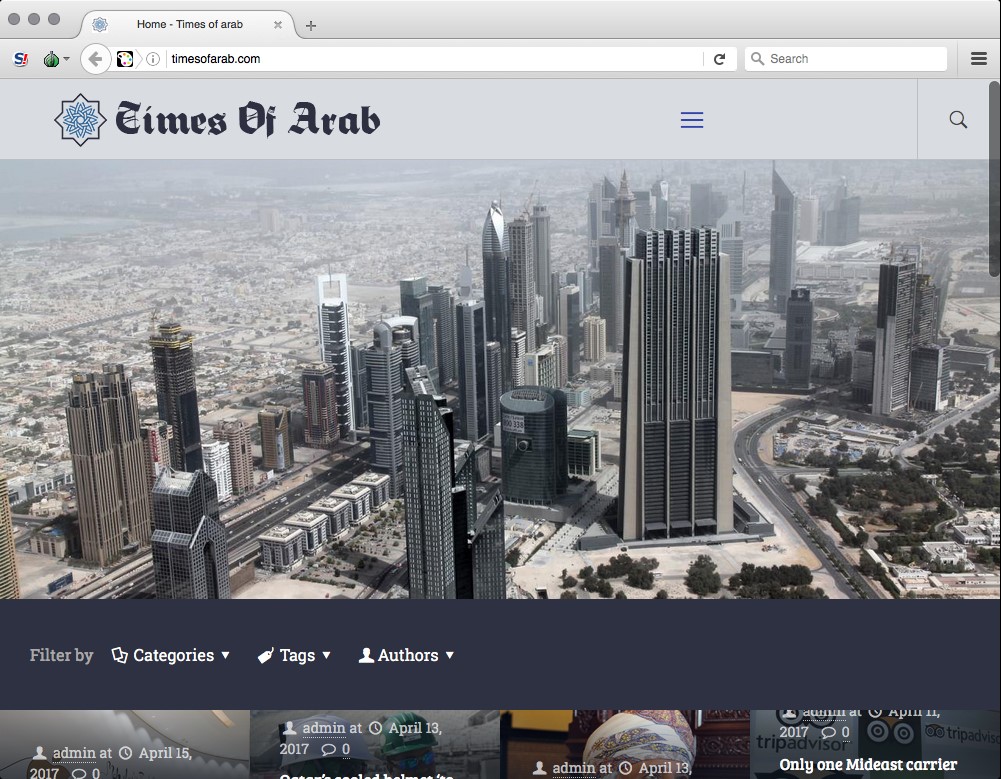
A weird 'news' website
The fourth domain contained a bizarre "news" website with the ungrammatical title "Times of Arab" which promised "to bring substantial news to the surface, which is otherwise underreported by the global media". Its mission satement continued:
"Our journalists ensure the stories that reach you are impartial and unaffected from any sort of vested interest. We want to reshape the world media by strengthening our bond with the readers, a bond formed with trust and truth ..."
Its content, however, was utterly weird and sometimes nonsensical. Articles were copied from elsewhere, often with headlines or pictures that didn't match. Some of the material seemed to have been chosen unread, based on a keyword search. One article, for example, had a headline about the Arab Spring but the text beneath it reported basketball game held during the spring in an Alabama town called Arab.
This highly entertaining publication was launched last January but, sadly, is now closed. A note on its website says "Account Suspended", though its Twitter feed can still be seen.
But what on earth was the purpose of "Times of Arab"? That, as Winston Churchill once said of Russia, is a riddle wrapped in a mystery inside an enigma.
Ultimatum to Qatar: surrender within 10 days, or else ...
Blog post, 23 June, 2017: Having placed Qatar under economic siege earlier this month – in a row that was triggered by a fake news report – Saudi Arabia, the UAE, Bahrain and Egypt have now issued a formal list of demands. Qatar has been given 10 days to comply, or face unspecified consequences.
The demands – assuming they have been accurately reported – amount to an ultimatum. There is no realistic prospect of Qatar agreeing to them, because to do so would effectively end its existence as an independent state.
It's not unreasonable to wish for changes in Qatar's behaviour but the same could also be said of the four countries on the other side – especially Saudi Arabia, which has done more over the years to promote religious intolerance and inspire terrorism than any other country in the region.
The demands seem less about securing an agreement that might bring change than escalating the current confrontation.
In effect, Saudi Arabia, the UAE, Egypt and Bahrain are asking Qatar to hand over control of its foreign policy to them. It will not be allowed to have diplomatic relations with Iran and its contact with Iran will be limited to trade and commerce that "complies with US and international sanctions". Qatar will not be allowed contact with political opposition figures in Saudi Arabia, the UAE, Egypt and Bahrain – even though other countries (including western countries) do so routinely. In addition, Qatar is being asked to hand over all its files on those opposition groups.
Severing links with terrorist organisations is a good idea in principle – except that Saudi Arabia, the UAE, etc, will be mainly responsible for deciding which groups to classify as "terrorist".
It's not unreasonable to wish for changes in Qatar's behaviour but the same could be said of the four countries on the other side – especially Saudi Arabia, which has done more over the years to promote religious intolerance and inspire terrorism than any other country in the region.
Qatar is also being asked to "end interference in sovereign countries’ internal affairs" while allowing Saudi Arabia, the UAE, etc, apparently unlimited interference in Qatar's own affairs. Qatar, according to the list of demands, must "align itself with the other Gulf and Arab countries militarily, politically, socially and economically".
Then there's the closure of Qatar's TV station, al-Jazeera. Obviously, the Saudis, Emiratis, etc, don't like it. But by the same token Qatar might reasonably demand the closure of the Saudi-owned al-Arabiya and the UEA-based Sky News Arabia.
Qatar is also told to stop funding several other news organisations, including Middle East Eye and al-Arabi al-Jadeed (also available in English as The New Arab). Both of those operate legally from the UK and their activities fall well within the bounds of free speech. They certainly have a political slant but they also produce some interesting news, of a professional standard.
Finally, Qatar is being asked to sign blank cheque covering "reparations and compensation for loss of life and other, financial losses caused by Qatar’s policies in recent years". Saudi Arabia, the UAE, Egypt and Bahrain have not specified an actual amount and say the sum will be determined in coordination with Qatar.
The Associated Press has circulated a summary of the 13 demands, translated from Arabic:
1. Curb diplomatic ties with Iran and close its diplomatic missions there. Expel members of Iran’s Revolutionary Guard from Qatar and cut off any joint military cooperation with Iran. Only trade and commerce with Iran that complies with U.S. and international sanctions will be permitted.
2. Sever all ties to “terrorist organizations,” specifically the Muslim Brotherhood, the Islamic State group, al-Qaida, and Lebanon’s Hezbollah. Formally declare those entities as terrorist groups.
3. Shut down Al-Jazeera and its affiliate stations.
4. Shut down news outlets that Qatar funds, directly and indirectly, including Arabi21, Rassd, Al Araby Al-Jadeed and Middle East Eye.
5 . Immediately terminate the Turkish military presence currently in Qatar and end any joint military cooperation with Turkey inside of Qatar.
6. Stop all means of funding for individuals, groups or organizations that have been designated as terrorists by Saudi Arabia, the UAE, Egypt, Bahrain, the United States and other countries.
7. Hand over “terrorist figures” and wanted individuals from Saudi Arabia, the UAE, Egypt and Bahrain to their countries of origin. Freeze their assets, and provide any desired information about their residency, movements and finances.
8. End interference in sovereign countries’ internal affairs. Stop granting citizenship to wanted nationals from Saudi Arabia, the UAE, Egypt and Bahrain. Revoke Qatari citizenship for existing nationals where such citizenship violates those countries’ laws.
9. Stop all contacts with the political opposition in Saudi Arabia, the UAE, Egypt and Bahrain. Hand over all files detailing Qatar’s prior contacts with and support for those opposition groups.
10. Pay reparations and compensation for loss of life and other, financial losses caused by Qatar’s policies in recent years. The sum will be determined in coordination with Qatar.
11. Consent to monthly audits for the first year after agreeing to the demands, then once per quarter during the second year. For the following 10 years, Qatar would be monitored annually for compliance.
12. Align itself with the other Gulf and Arab countries militarily, politically, socially and economically, as well as on economic matters, in line with an agreement reached with Saudi Arabia in 2014.
13. Agree to all the demands within 10 days of it being submitted to Qatar, or the list becomes invalid. The document doesn’t specify what the countries will do if Qatar refuses to comply.
Emirati leader 'asked US to bomb al-Jazeera'

Blog post, 28 June, 2017: Of the 13 demands made by Saudi Arabia and the UAE in their ultimatum to Qatar, the one causing most consternation internationally is the call for al-Jazeera to be shut down. On Wednesday, the BBC's renowned World Affairs Editor, John Simpson, and David Kaye, the UN's Special Rapporteur on freedom of opinion and expression, were the latest to object.
Simpson said closure of Qatar-based broadcaster would be "serious step backwards for the whole world" and Kaye said it would be a "major blow against media pluralism".
For the Saudis and Emiratis, though, its closure would be a step towards more "responsible" journalism. “We do not claim to have press freedom," Omar Ghobash, the UAE's ambassador to Moscow told the Guardian. "We do not promote the idea of press freedom. What we talk about is responsibility in speech."
The Emiratis – as a leaked diplomatic cable shows – have had al-Jazeera in their sights for years, and shutting it down is not the most drastic solution they have ever contemplated.
In 2001, shortly before the start of the Afghan war, Qatar's emir complained to Sheikh Zayed, the UAE's president, about Mohammed bin Zayed, one of the sheikh's sons.
According to the emir, Mohammed bin Zayed – who at the time was chief of staff of the Emirati armed forces – had asked Tommy Franks, the American general in charge of CENTCOM, to bomb al-Jazeera.
Sheikh Zayed is said to have responded to the emir's complaint with the derisive reply: "Do you blame him?"
Mohammed bin Zayed's desire to bomb al-Jazeera – or rather, to have the Americans bomb it for him – doesn't seem to have harmed his career. Today, MBZ (as he is widely known) is Crown Prince of Abu Dhabi and Deputy Supreme Commander of the UAE's armed forces. Along with the Saudi Crown Prince, he is also seen as one of the key figures leading the current feud with Qatar.
The story of the Qatari emir's complaint was recounted by MBZ himself during a meeting in January 2003 with the State Department's Director of Policy Planning, Richard Haass. Describing other parts of their conversation, the leaked diplomatic cable says:
"MBZ noted that public opinion in the Arab world would be containable provided military action [the invasion of Iraq] was short and decisive. Keeping Israeli PM Ariel Sharon in his box was also important.
"Returning to a common theme in his discussions with visiting US officials, MBZ emphasised the importance of reining in the Doha-based al-Jazeera satellite network prior to any military action. He recommended against sending in journalists with war fighters – at least in the beginning – as the prospect of televising scenes of civilian casualties was just too risky.
"MBZ said it was a mystery to him why the Qataris continued to inflame public opinion via JSC [Jazeera Satellite Channel] and suggested that the US use its weight to pressure Doha."
Whether at the behest of MBZ or not, the Americans did subsequently bomb al-Jazeera (twice) – though not its Doha headquarters. In 2001, during the Afghan war, an American missile destroyed the station's office in Kabul. In 2003, during the Iraq war, another American missile hit al-Jazeera's office in Baghdad, killing reporter Tareq Ayyoub.
Saudi minister says Qatar has declared war
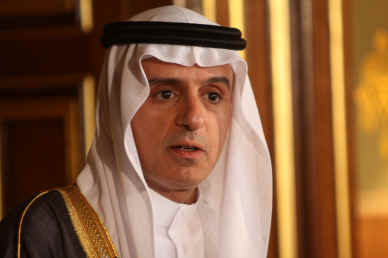
Blog post, 31 July 2017: Saudi Arabia has accused Qatar of "declaring war" on the kingdom in a dispute over the hajj – the annual Muslim pilgrimage to Mecca.
At a press conference yesterday Saudi foreign minister Adel bin Ahmed al-Jubeir said Qatar was seeking to "internationalise" the holy sites (Mecca and Medina), describing this as aggressive and a declaration of war against Saudi Arabia.
He added: "We reserve the right to respond to any party working in the field of internationalising the holy sites."
Jubeir's remarks were reported by the official Saudi news agency (Arabic version here) along with various other media organisations.
Saudi Arabia's control over the holy places, and especially its organisation of the hajj, has been questioned by Muslims from time to time – often after fatal accidents. Last year, for example, in an article for Huffington Post, Anisa Mehdi wrote:
Concerns about Saudi Arabia’s authority over the two sites [Mecca and Medina] have been simmering for some time, but the deadly stampede that took place there during the 2015 hajj pilgrimage has lent greater urgency. Two months of the tragedy at the Jamarat Bridge where pilgrims perform the hajj’s penultimate ritual, the death count was more than 2,400.
Criticism and blame were quick to follow, and many leveled accusations of inept management against the Saudi government. Riyadh in turn placed the fault with the pilgrims for allegedly failing to follow instructions. Muslim leaders looking for a solution have begun to suggest that it might be time for the reigning House of Saud to relinquish its absolute control over the two cities, which lie within the geographic boundaries of the kingdom – boundaries won by conquest.
The California-based Muslim Public Affairs Council suggested, “If Saudi Arabia cannot handle the scrutiny and answer the challenging questions, it is time to re-evaluate its roles and responsibilities for the hajj.” London’s Islamic Human Rights Commission chimed in, suggesting “some sort of Islamic Waqf, as it was at the time of Ottomans, [to make] sure that the main Muslim nations will actually have a say and they coordinate how this whole thing [is] run.”
Iran's supreme leader, Ayatollah Ali Khamenei, made a similar call after disputes with the Saudi authorities resulted in Iranian pilgrims being excluded from last year's hajj:
“Because of Saudi rulers' oppressive behaviour towards God's guests, the world of Islam must fundamentally reconsider the management of the two holy places and the issue of hajj,” Khamenei said.
Oddly, in the light of the Saudi minister's war talk, there appear to have been no calls of that kind by Qatar. Yesterday, Qatar's foreign minister and the ministry of religious endowments (awqaf) both insisted that none had been made – though Qatar has accused Saudi Arabia of "politicising" the hajj.
On Saturday, Qatar's government-appointed National Human Rights Commission (NHRC) said it had filed a complaint with the UN's special rapporteur on freedom of belief and religion over what it sees as restrictions on Qatari pilgrims. This may be the basis of the Saudi minister's claim that Qatar is seeking to "internationalise" the holy sites, though it hardly seems like grounds for war.
Saudi Arabia says Qataris are welcome to take part in the hajj, which begins at the end of August, but the economic siege imposed on Qatar by Saudi Arabia, the UAE, Bahrain and Egypt has caused some practical difficulties.
Since the land border is closed, Qatari pilgrims are being told they must travel to the hajj by air, arriving either at Jeddah or Medina airport. They will not be able to fly with Qatar Airways because it is banned from Saudi airspace.
Qatari pilgrims will also have to apply for visas on arrival rather than in advance (presumably because of the severing of diplomatic relations).
Meanwhile, Saudi media are accusing Qatar of trying to keep its citizens away from the pilgrimage. According to the Saudi-owned al-Arabiya, Qatar has been preventing them from registering for the hajj by suspending the relevant website. It's unclear whether the suspension was due to a decision by the authorities or technical problems on the website.
Qatar row: Gulf hoaxers lobby UK parliament
Blog post, 8 September 2017: The Saudi/Emirati squabble with Qatar which began in May with a fake news item on a hacked website has continued in the form of a virtual reality game which almost nobody outside the Gulf views as seriously as the protagonists themselves.
The latest round of cat-fighting relates to a conference on "Qatar, Global Security & Stability" which is due to be held in London on September 14.
The conference is reportedly being organised by Qatari exiles who hope to replace the current emir in a "bloodless coup". It's doubtful whether they have any significant support inside Qatar but the event is being actively promoted by Saudi and Emirati media.
Organisers of the conference claim to have secured backing from a solitary British MP, Daniel Kawczynski, whose involvement is not very surprising since he is a staunch supporter of Qatar's arch-foe, Saudi Arabia. Such is Kawczynski's enthusiasm for the kingdom – which he regards as a victim of "extraordinary ignorance and prejudice" – that he has been jokingly referred to as the Member of Parliament for Saudi Arabia.

Given that background, Kawczynski's participation in what is supposedly a "Qatari opposition" conference is unlikely to enhance its credibility and could easily have the opposite effect. Nevertheless, someone – presumably not a million miles from Doha – became alarmed at his involvement and instigated moves to stop him attending.
A strange PR firm
On Wednesday the London Centre for Public Affairs sent a letter of complaint to the House of Commons Foreign Affairs Committee – of which Kawczynski is a member. It demanded that Kawczynski be expelled from the committee if he takes part in the conference (which the letter described as "a hoax by the UAE and its lobby and pressure groups").
The letter, signed by "J Baker", ended with the words: "Looking forward to hearing from you." This was a very strange thing to say because the letter included no address for a reply. It did give a phone number, but that was false.
The letter became public when it was posted on Twitter by Dr Andreas Krieg of the Defence Studies department at King's College London who has previously worked as a contractor with the Qatari armed forces.
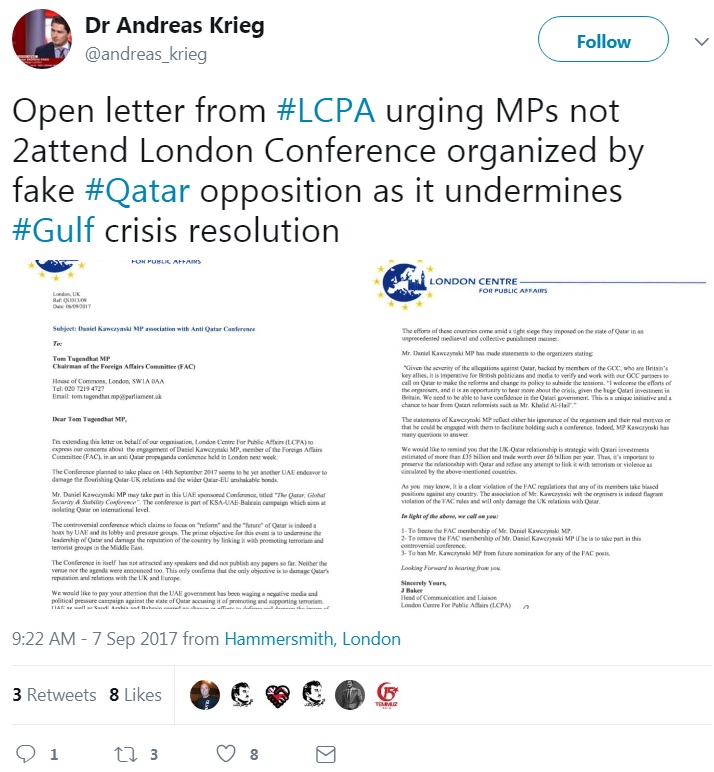
Also on Wednesday, besides its letter to parliament, the London Centre for Public Affairs issued a press release saying it has written to British MPs urging them "to work towards developing relations with Qatar". It went on to suggest that the planned conference could have a "negative implication" on relations between Britain and Qatar, hinting that it might jeopardise Qatar's massive investments in the UK.
The London Centre for Public Affairs describes itself as "an independent, nongovernmental organisation" offering "unique and tailored consultancy advice in the field of media, public affairs, politics and public relations".

Its website, written in often-ungrammatical English, talks about providing clients with "political and public policy advice" but gives no information about the backgrounds of its staff or their expertise. Clicking on the "Expertise" section of the website brings up an empty page saying "Nothing found".
The website does have photos of two unnamed men who are said to represent its "media team" and its "public affairs team". The faces of the same two gentlemen can be found in at least two other places on the internet – as satisfied clients of Paul McAndrew, a lawyer in Iowa, and giving testimonials for a financial services company in Manchester.


The address of the London Centre for Public Affairs is stated on the website as Marble Arch Place in central London. If so, its office staff must be working under unusually difficult conditions because Marble Arch Place is a new building development, not due to be completed until 2020.
Ownership of the London Centre for Public Affairs remains a mystery. Although it appears to be a public relations firm there is no trace of it in the register of British companies and its website was registered by Identity Protect Limited which, as the name suggests, is a company used by website owners who value their privacy.
The upshot is that we now have a hoax PR firm (presumably representing Qatar) attacking the UAE for organising a "hoax conference" about Qatar.
The levels of intrigue and deception emanating from Gulf states are certainly entertaining to watch but it's unclear what purpose they serve. If the Qataris are unhappy about the "opposition" conference, can't they just say so in the obvious way: through their ambassador? And if they want to issue a press release, why not use a real PR firm instead of a fake one?
Zionists, anti-Zionists and the war of words over Qatar
Blog post, 9 September 2017: Qatar, which is reportedly paying a public relations firm $50,000 month to "improve ties with the Jewish community worldwide", has accused the UAE of employing "Zionists" to organise an anti-Qatar conference.
A news item published in Arabic by the Qatari-owned al-Jazeera on Thursday began:
"The London Centre for Public Affairs has revealed that pro-Israel advertising companies and the Zionist lobby in America are preparing to hold a conference against Qatar in London on the 14th of this month.
"The centre announced ... that the conference is funded by the UAE government and will be organised by a Zionist propaganda company headed by Steve Rabinowitz, an expert in public relations and director of Bluelight Strategies, one of the strongest advocates for Israel in America."
Since May, a vicious war of words has been raging in the Gulf, with Qatar on one side of the quarrel and Saudi Arabia, the UAE and Bahrain (plus Egypt tagging along) on the other. In the often-hypocritical propaganda campaigns both sides have accused each other of supporting terrorism but accusations of supporting Israel and/or Zionism have occasionally been thrown into the mix too.
Qatar's 'good' relations with Israel
The opening shot in the battle came when someone hacked the website of Qatar's government news agency and planted a fake news item quoting a fictitious speech by the Qatari emir. The effect of this was to damage the emir in the eyes of Gulf citizens, creating a pretext for the rumpus that followed.
One remark attributed to the emir in the fake story was that Qatar has "good" relations with Israel. This is broadly true but it's not something Gulf rulers usually boast about, for fear of a hostile reaction from public opinion. The remark formed only a small part of the imaginary speech but, given the context, it's likely that the reference to good relations with Israel was included in the expectation that Arabs would view it negatively.
Leaked emails
Since June, in what many view as Qatari retaliation for the hacking of its government website, mysterious sources have been leaking emails from an account belonging to Yousef al-Otaiba, the Emirati ambassador in Washington. Several of these have focused on somewhat tenuous connections between the ambassador and Israel.
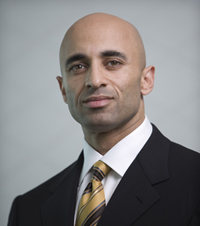
The first batch of leaked emails highlighted Otaiba's friendly relations with the Foundation for Defense of Democracies, a think tank which has been heavily funded by several American Republicans who are also strong supporters of Israel.
In August, Middle East Eye reported another leak which showed Otaiba had been in email contact with Uzi Rubin, a former brigadier general in the Israeli forces. (Middle East Eye is one of several websites whose closure was demanded by Qatar's adversaries in a 10-day ultimatum which expired more than two months ago.)
Controversial conference
Next week's conference in London, entitled "Qatar, Global Security & Stability", is claimed to be about "envisioning a true approach to democracy, human rights, press freedom and counter-terrorism in Qatar". Others see it as part of a plot to destabilise Qatar's emir and replace him with someone more amenable toward Saudi/Emirati policies. It is fronted by Khalid al-Hail, a Qatari exile who is said to be funding it himself.
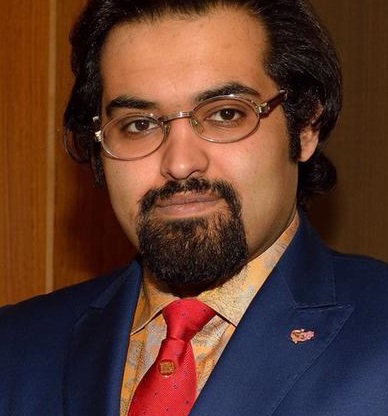
The conference has come under attack from the London Centre for Public Affairs (LCPA), a mysterious and apparently Qatari-inspired organisation with a bogus address and a false phone number. In a protest letter sent to the British parliament's Foreign Affairs Committee on Wednesday, LCPA described the conference as "a hoax by the UAE and its lobby and pressure groups".
The additional claim, attributed to LCPA and reported by al-Jazeera – that the event is being "organised by a Zionist propaganda company" – seems to have been intended only for Arab consumption. Al-Jazeera reported it in the Arabic section of its website, but not the English section. There is also no mention of it on LCPA's website, which is entirely in English.
Enter Rabinowitz
A press release issued on behalf of the conference directs media enquiries to Jason Nisse of The Nisse Consultancy (a British PR firm) and Steve Rabinowitz of Bluelight Strategies in the United States.
Rabinowitz, who was director of media planning at the White House under President Bill Clinton, has long-standing ties with the Democratic Party as well as various Jewish organisations. During the 2016 presidential election he was involved in Jews for Progress, aimed at persuading Jewish voters in swing states to support Hillary Clinton. During the past week he has posted several times about the Qatar conference on Twitter.
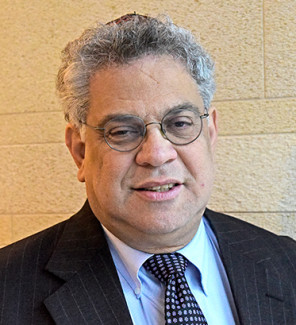
When Rabinowitz established Bluelight in 2014, BuzzFeed reported that it would be focusing on "progressive issues, both foreign policy and otherwise". Explaining the choice of name, Rabinowitz said: "The blue is progressive politics in America, and you know, the Jews can think it's Jewish too if they want."
Qatar seeks Jewish support
Meanwhile last Tuesday, under the headline "Qatar reaches out to Jewish community", a website specialising in news about PR and marketing reported that Qatar has signed a $50,000-a-month contract with Stonington Strategies which is headed by Nick Muzin, "a doctor, lawyer and Republican strategist who is active in Jewish affairs".
The article described Muzin as "the driving force behind a coalition of more than 50 groups, including tea party, evangelical and Jewish organisations, to oppose the Iran nuclear deal" and quoted him as saying:
"Engagement with Qatar can only be in the best interests of the United States and the Jewish community, as we cannot allow Qatar to be ostracised by its neighbors and pushed into Iran’s sphere of influence."
The article continued:
"For Qatar, which is under an economic and political blockade by Muslim states, Muzin will advise on ways to build a closer relationship with the United States and improve ties with the Jewish community worldwide.
"He will explore opportunities for political, cultural and economic cooperation with the U.S. and Israel, especially in the areas of trade, real estate, job creation and technology."
Over at Bluelight, news of the Qatari contract infuriated Rabinowitz who told the Israeli newspaper, Haaretz:
"Qatar has its own billion dollar world-wide whitewash, I mean PR effort, that includes its own television network. Half-a-million-dollars a year to court American Jews is chump change — and we Jews are the chumps if we buy any of it."
He added that Qatar is "the one country that alone is funding Hamas, the Muslim Brotherhood and al-Nusra Front".
Continue reading >>>


